Reports: Illuminating Sudan’s Realities
“Niertiti – West Jebel Marra: Critical Humanitarian Conditions in IDP Shelters”
2 February 2026
Internally displaced persons (IDP) shelters in the city of Niertiti are witnessing an alarming deterioration in humanitarian conditions, amid severe shortages of food, medicine, shelter items, and educational supplies, despite the presence of several humanitarian organizations operating in the area. However, the continuous influx of displaced people since 2023 has exceeded the capacity of these organizations to respond to the growing needs.
According to field testimonies obtained by Sudan Sawa Sawa, a displaced woman identified as Kaltuma Adam stated that she is suffering from undiagnosed illnesses, in addition to her daughter being ill. She explained that the harsh economic conditions prevent her from meeting even the most basic necessities of life, including healthcare, food, and education. She added that she was forced to sell some shelter Items, such as tarpaulins distributed by aid organizations, in order to cover more urgent needs. She emphasized that displaced people depend entirely on humanitarian organizations and called for the provision of blankets, mattresses, tarpaulins, clothing, as well as food and medicine.
In another testimony, a displaced woman said that some families have resorted to working on nearby farms in exchange for agricultural produce, part of which is used for household consumption while the remainder is sold in local markets to bridge livelihood gaps. She added that her son has been suffering from burns for nine days without access to treatment or adequate shelter Items, stressing that conditions have reached a point where families are unable to provide food and drinking water for their children.
For his part, Jamal Hassan , a representative of the Boys’ Secondary School Complex shelter, stated that the shelter centers are in urgent need of additional support. He explained that the number of displaced families at the site has exceeded 165 households, with an estimated total of around 690 individuals. He confirmed that the currently available supplies are insufficient to ensure food and health security, forcing some families to sell part of the assistance they receive in order to meet other unmet needs. He called on humanitarian organizations to increase both the quantity and quality of aid, particularly shelter materials, food, and water, in addition to addressing the needs of children, the elderly, and adolescent girls.
In a related context, the displaced woman, Mahasin Dawood Haroun recounted her suffering after fleeing from the city of El Fasher, noting that her husband went missing during the displacement journey and his death was later confirmed. She said she now lives in Niertiti without any breadwinner and faces extreme difficulties in providing food and water for her children. She stressed that the assistance provided, despite its importance, does not cover all needs, forcing her to sell part of it to meet other necessities. She added that her living conditions worsened further after her husband’s death, to the extent that she was unable to hold a condolence gathering for him.
Mahasin expressed her hope for an end to the war, believing that stopping the conflict would significantly improve living conditions and open up employment opportunities. She pointed out that the current priorities for displaced families are food, water, clothing, mattresses, and medical care, amid harsh humanitarian conditions in which some children are suffering from lack of clothing and illness.
The displaced people in Niertiti renew their appeal to local and international humanitarian organizations to intensify humanitarian interventions and expand support, in order to ensure the minimum requirements for a dignified life in the shelters, amid ongoing waves of displacement and worsening economic and humanitarian conditions.
“Rabak Under Pressure: Security Breakdown, Displacement, and Rising Costs Deepen White Nile State’s Crises”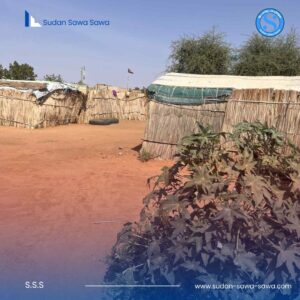
Sudan Sawa Sawa – December 5, 2025
More than 300 kilometers southwest of Khartoum, the city of Rabak appears calmer than many Sudanese cities since the outbreak of the 15 April war. But that calm belies the complexity of daily life. According to residents and field sources who spoke to Sudan Sawa Sawa, the city has endured an overlapping crisis throughout 2024 and 2025, marked by security unrest, a surge in displacement, economic collapse, and the rise of child recruitment.
1/ Security Breakdown Shatters Any Sense of Stability:
Although fighting did not reach Rabak directly, security incidents have surrounded the city and spilled into several neighborhoods. Blocks 27, 29, and 30 have been among the hardest hit by looting and assaults.
A resident of Block 29 told Sudan Sawa Sawa:
“The problem isn’t the weapons… the problem is that no one responds when we need help.”
Despite continued commercial activity with neighboring areas, Rabak’s residents live in constant fear.
2/ Displacement Overwhelms Services and Pushes Rents to Record Highs:
Rabak has become a major destination for thousands of displaced families fleeing Khartoum, Gezeera, Sennar, and other states—an influx far beyond the city’s limited capacity. Schools were turned into overcrowded shelters before later being cleared to resume classes.
One displaced man said:
“We searched for a room at any price… but after the shelters were evacuated, rents jumped to one million pounds. Many people slept outdoors.”
Before the war, the average rent for a room was around 50,000 pounds; it later exceeded one million—one of the steepest rent hikes in the region’s history. With minimal humanitarian response, the local community has borne much of the burden despite its own hardships.
3/ Unregulated Markets and Price Manipulation Strain Families:
Rabak’s economy has not only suffered from the war; the absence of market oversight has exacerbated the crisis, creating fertile ground for speculation and uncontrolled price hikes.
A vendor in the Rabak market noted:
“Goods were available… but with no law in place, prices were set by the traders’ whims.”
This reality has severely strained families reliant on agriculture, trade, and livestock, amid unprecedented living costs.
4/ Child Recruitment: A Growing Hidden Threat
Sudan Sawa Sawa documented the expansion of under-18 recruitment, driven by financial incentives or emotional narratives promising to “protect the community.”
A youth recruited at age 16 recounted:
“They told us we would defend our people… we didn’t understand what was happening. They treated us like adults when we were still children.”
Weak protection programs and the retreat of humanitarian organizations have allowed the phenomenon to spread quietly, leaving deep social and psychological scars.
5/ A City on the Brink
These intertwined security, economic, humanitarian, and social challenges reveal a city facing a clear administrative and security vacuum while struggling to endure with limited resources. Beneath its surface calm lies, a reality weighed down by crisis.
Amid a war that continues with no end in sight, Rabak today is more than a transit point—it is a concentrated reflection of the broader national catastrophe engulfing Sudan.
“Humanitarian Situation Deteriorates in Kordofan: Escalating Displacement, Child Recruitment, and Absence of Aid in Al-Muglad”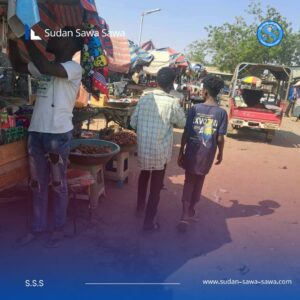
Sudan Sawa Sawa – November 30, 2025
Humanitarian Situation in Kordofan:
The Kordofan region, particularly the locality of Al-Muglad in West Kordofan state, has been experiencing a rapid and severe deterioration in humanitarian and security conditions since the outbreak of the conflict in Sudan on April 15, 2023. This report highlights the key aspects of the worsening security, living, and social conditions, with a focus on the challenges facing both residents and displaced people in the absence of official humanitarian support.
1/ Fragile Security Situation and the Dominance of the Rapid Support Forces:
– Total Field Control: Since the onset of the war, the city of Al-Muglad has been under the full control of the Rapid Support Forces (RSF), with local militias, especially from the Misseriya tribe, forming the main armed groups in the area. Other Arab tribes have a limited presence.
– Clashes and Rising Tensions: West Kordofan has seen violent clashes after the army withdrew from several positions, leading to an increase in RSF control and a worsening of the security breakdown.
– Child Recruitment: Children under the age of 16 have been recruited by armed groups in exchange for large sums of money, representing one of the most serious violations in the region. This situation threatens the future of many children, exposing them to violence and exploitation.
2/ Deterioration of Living Conditions and Increase in Looting Crimes:
– Looting of Residential Areas: There has been a significant rise in organized looting of homes in Al-Muglad. In some cases, people lost their lives while attempting to protect their property, according to local sources.
– Targeting of Markets and Shops: Markets and small shops have also been targeted, with perpetrators justifying their actions by claiming they were “guarding” the area.
– Looting on Main Roads: The insecurity on roads leading to Al-Muglad has disrupted trade, leading to skyrocketing prices and a shortage of basic foodstuffs due to goods being looted during transport.
3/ Escalating Humanitarian Crisis and Massive Displacement:
– Unprecedented Waves of Displacement: Al-Muglad has received large waves of displaced people fleeing from various areas in Kordofan, including: Babanusa, the entirety of Bilila, El-Obeid, Al-Nahud, and several other rural areas.
– Economic and Humanitarian Challenges: Many displaced people have lost their livelihoods and possessions, making it nearly impossible for them to access food amidst soaring prices and the collapse of the local market. There are no international or national humanitarian organizations present in the area, leaving local efforts as the sole response.
– Limited Local Efforts: Despite limited resources, local youth and women’s initiatives have been providing basic assistance. Some local traders have also offered limited support, though it is far from sufficient to meet the growing needs.
– Crisis for Children: Schools are overcrowded with displaced children, leading many to take to the streets and leaving educational opportunities scarce. Children aged 10 to 14 have been forced into the labor market to support their families, exposing them to exploitation and depriving them of their right to education.
4/ Conclusion and Recommendations:
– Summary of the Situation: Al-Muglad is facing a severe humanitarian crisis characterized by insecurity, child recruitment, widespread looting, and the deterioration of conditions for displaced populations, all compounded by the absence of external aid. This makes the region one of the most vulnerable hotspots in Kordofan.
– Community Recommendations:
1/ Provide urgent food and shelter assistance to displaced families, focusing on the most vulnerable households.
2/ Protect children by ending their recruitment and implementing support programs for families dependent on child labor.
3/ Support local initiatives with necessary materials and funding to expand the scope of aid.
4/ Secure transportation routes to ensure the flow of relief supplies and commercial goods to Al-Muglad and surrounding villages.
Human Rights Report:
“Forgotten Conflict, Forgotten Nation”
Will anyone listen to the voices of the victims in Sudan?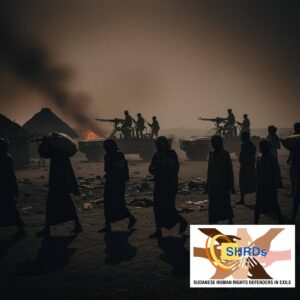
Sudan Sawa Sawa, November 28, 2025
To read the full report in English & Arabic, click on the link below:
Excutive Summary AR Excutive Summary ENG Sudan_Report_AR READY Sudan_Report_EN READY
“Al-Silaia Locality Faces Acute Health Crisis: Shortage of Medicines and Medical Centers Threatens Hundreds in West Darfur”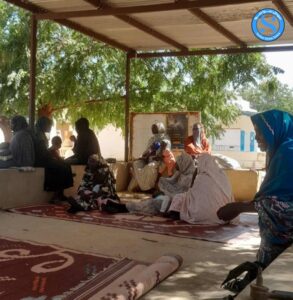
Sudan Sawa Sawa– October 27, 2025
Al-Silaia locality in Jebel Moon, West Darfur State, is witnessing a rapidly deteriorating health situation amid a severe shortage of medicines and a lack of qualified medical centers — a crisis that threatens the lives of hundreds of residents, particularly children, women, and the elderly.
Local sources told Sudan Sawa Sawa that the area is experiencing a genuine health emergency following a sharp rise in acute malnutrition cases in recent weeks, caused by food shortages and weak medical services. The main pharmacy at Jebel Moon Hospital has reportedly run out of essential medicines used to treat malaria, fever, and diarrhea — diseases that are spreading widely across the region.
Most Affected Groups:
Children under five, pregnant women, and the elderly are the most vulnerable groups, as many lack the means to travel long distances to reach medical facilities in neighboring towns.
Crisis Location:
Jebel Moon locality lies in a remote part of West Darfur that has long suffered from poor infrastructure and a lack of paved roads, hindering the delivery of medical supplies and humanitarian assistance.
Roots of the Crisis:
The situation began to worsen several months ago and reached its peak over the past two months due to disruptions in medical supply chains and the closure of some health centers, caused by a lack of funding and deteriorating security conditions.
Key factors behind the health decline include:
– Irregular medical supply from the Ministry of Health and Humanitarian organizations.
– Insufficient number of operational health centers compared to population size.
– Shortage of medical staff due to unpaid salaries and poor security conditions.
– Weak response from humanitarian organizations working in the health sector.
Community Suffering:
With no local health services available, many residents are forced to travel to Geneina city for treatment, a dangerous and costly journey that exposes patients, especially children, to serious complications that can lead to death before reaching medical care.
Urgent Calls for Intervention:
Residents of Jebel Moon are calling on health authorities and international organizations to act immediately by:
Dispatching emergency medical convoys.
Supplying Jebel Moon Hospital with essential medicines and equipment.
Establishing nutrition centers for children to address malnutrition cases.
Deploying permanent medical staff to work continuously in the area.
“Water and Power Outages, Rising Prices Amid Deteriorating Security Situation”
Sudan Sawa Sawa – October 26, 2025
The city of Al-Damazin has been facing a severe living crisis since October 20, 2025, following the disruption of water, electricity, and ice supplies amid escalating insecurity in the area.
According to local sources who spoke to Sudan Sawa Sawa, the security situation has worsened over the past few days, with an increased presence of drone activity during the evening hours. This has prompted authorities and residents to close markets as early as 5 p.m., fearing the use of anti-aircraft weapons in response to the drones, which has caused widespread panic among the population.
The situation has also led to a sharp rise in the prices of essential goods. The price of a jerrycan of water has surged from 200 Sudanese pounds to 1,000 pounds in just four days, while the price of an ice block has jumped from 6,000 to 20,000 pounds.
Sources confirmed that all neighborhoods in the city are suffering from an acute shortage of water. They noted that some areas are located far from the river, making access to water a daily challenge—particularly for low-income families.
Residents have called on the relevant authorities to take urgent action to restore security and improve basic services, warning that the continuation of the current situation could lead to a worsening humanitarian and living crisis in the city.
“Young Man Killed in Armed Attack in Kala – Sarf Omra, North Darfur”
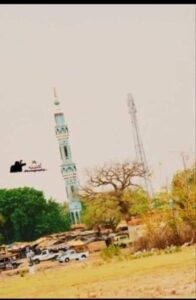
Sudan Sawa Sawa – October 23, 2025
A tragic armed robbery claimed the life of a young man in the Kala area of Sarf Omra locality, North Darfur, on the evening of Thursday, October 9, 2025. The victim, identified as Adam Yahya Adam Jado (25 Yrs), was a fatal shot while returning home after Maghrib prayers.
Details of the Incident:
According to eyewitnesses who spoke to Sudan Sawa Sawa, two armed men intercepted the victim near the southern yard of Kala School at around 6:47 p.m. The assailants reportedly threatened him at gunpoint, demanding his mobile phone. When Adam resisted, one of the attackers fired two shots, inflicting severe injuries.
The victim was rushed to Sarf Omra Teaching Hospital, where he underwent surgery the following day (October 10). However, his condition deteriorated, and he succumbed to his injuries in the early hours of Saturday, October 11, 2025.
The Victim and Community Reaction:
Adam Yahya Jado was married and the father of two children. He was well-known in the community for his good character and kind reputation. News of his death has deeply shocked local residents, sparking widespread grief and anger.
Security Situation in Sarf Omra:
The killing has triggered outrage among citizens, who are demanding swift action from local authorities to curb the growing state of lawlessness in North Darfur.
Sources told Sudan Sawa Sawa that the security vacuum in Sarf Omra locality has contributed significantly to the surge in armed crimes. The incident is described as one of the most brutal in recent months, amid a worrying rise in attacks targeting civilians.
“Siege of El Fasher Forces Hundreds of Families to Flee to Tawila Amid Deteriorating Humanitarian Conditions”
Sudan Sawa Sawa – October 22, 2025
The city of El Fasher is facing a dire humanitarian crisis due to a siege that has lasted for nearly a year and a half, severely worsening living conditions and forcing large numbers of residents to flee in search of safety.
On October 19, a total of 214 displaced families arrived in the Tawila area from El Fasher, including 68 injured individuals, according to field sources. Reports indicate that the health conditions of the new arrivals are extremely critical. Children are suffering from severe malnutrition, while the elderly face serious physical and medical complications due to exhaustion, lack of food, and medicine.
Eyewitnesses among the displaced told Sudan Sawa Sawa that many had sustained injuries of varying severity and that conditions inside El Fasher continue to deteriorate. The prices of essential goods have skyrocketed, with the cost of a single sack of flour reaching 50,000 Sudanese pounds.
Witnesses also reported that the Rapid Support Forces (RSF) separated 60 young men from those fleeing the city. Their whereabouts remain unknown, raising deep concern among the displaced families.
Local humanitarian organizations have stressed that the situation in El Fasher and Tawila demands urgent international intervention, calling on relief agencies to provide medical and food assistance to the displaced population and help prevent famine and disease among those still trapped in the besieged city.
“New Waves of Displacement from El Fasher to Tawila …. Stories of Pain Repeat as the Flight from Death Continues”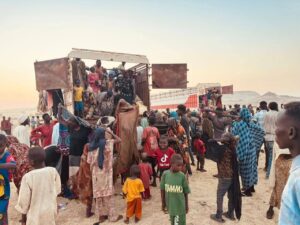
Sudan Sawa Sawa – October 20, 2025
The flow of displaced families from the city of El Fasher toward Tawila continues, as new groups flee the escalating fighting and worsening humanitarian conditions in North Darfur State. Among the new arrivals are women, children, and people with disabilities — all recounting to Sudan Sawa Sawa painful stories of fear, hunger, and the desperate search for safety.
Sitting exhausted near the reception center in Tawila, Rania Abdullah recalls her harrowing journey with her mother and disabled child. Her voice trembles with fatigue and tears:
> “We are exhausted. We have nothing to eat. The price of umbaz has reached 35,000 pounds, so we grind it to make starch and porridge. Many people in El Fasher have died, and there’s no one left to even bury the dead.”
Rania says she decided to leave El Fasher after losing all hope of survival:
> “We found a driver who said he’d take us to Turrah for 200,000 pounds. But when we reached the checkpoint, they demanded one billion. I didn’t have that kind of money. My husband’s been missing for four months — I don’t even know where he is.”
She adds sadly that the nights on the road were filled with fear:
> “Girls are being assaulted at night in exchange for free rides.”
Ibrahim Ahmed Abkar, who fled the Abu Shouk camp, describes a 20-day journey through valleys and remote areas:
“We left on the 15th of Rajab. The road was full of gunfire and looting. At first, vehicles were taking people for free, but once we reached the checkpoint, they started demanding a billion, 800,000, or 700,000 pounds. Those who couldn’t pay weren’t allowed to pass. It took us twenty days to finally reach Tawila.”
At the Tawila camp, emergency committees are working to ease the suffering of the displaced. Musab Al-Zain Omar, head of the local emergency room, told Sudan Sawa Sawa:
“We grieve for those we’ve lost and pray for the recovery of the wounded and the return of the missing. Our main goal is to help people. The war has left deep scars, but the most important thing is to remain humane. There are many new arrivals, and we’re coordinating with partners to provide food and water. Hopefully, together, we can manage.”
According to field reports obtained by Sudan Sawa Sawa, the Tawila locality received about 213 families (roughly 620 individuals) on Sunday, October 18, including 22 wounded persons and several children suffering from malnutrition and diseases caused by the lack of medical care.
The road linking El Fasher and Tawila now sees dozens of families arriving daily, while the city itself has turned into a fierce battlefield where civilians have become the fuel of a merciless conflict. Eyewitnesses told Sudan Sawa Sawa that several civilians died of hunger and thirst while trying to flee, and that some bodies remain unburied in the streets. The price of a measure of “Umbaz” has soared to 50,000 Sudanese pounds, reflecting the total collapse of living conditions.
One resident summed up the despair:
“Death has become closer than life…” Everything has collapsed, even human values.”
Humanitarian organizations have warned of a worsening catastrophe, urging the United Nations and the international community to take immediate action to impose a humanitarian truce in El Fasher and to open safe corridors for aid delivery.
Amid these dire conditions, the displaced in Tawila camp cling to a faint hope of stability — their stories standing as a living testimony to a human tragedy that continues to unfold each day in North Darfur.
“Education in Darfur Amid War and Displacement: A Lost Generation Searching for Hope”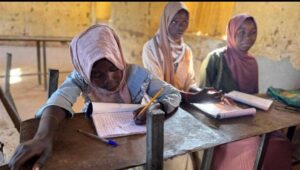
Sudan Sawa Sawa – October 19, 2025
The Darfur region in western Sudan has been witnessing a profound humanitarian and educational tragedy since the outbreak of armed conflict in 2003, which forced millions from their homes. More than two decades later, the people of Darfur continue to pay the price of war and marginalization. Schools have become shelters for displaced families, universities lie in ruins, and an entire generation now stands on the brink of being lost.
Education at the Mercy of War:
Over the years of conflict, Darfur has lost much of its vital infrastructure, with education being among the sectors hit hardest. The region suffers from the destruction of school facilities, a severe shortage of qualified teachers, and the lack of basic learning materials.
Following the eruption of the most recent conflict on April 15, the crisis deepened further. Many schools and universities were destroyed, and classes came to a halt across most areas. Numerous educational institutions have been turned into shelters for displaced people, while thousands of students were unable to sit for the Sudanese Certificate Examination due to insecurity, the absence of exam centers, and the difficulty of travel.
Higher Education Collapse and the Challenges of Remote Learning:
University students in Darfur have fared no better. Most universities have shut down or collapsed entirely. Distance learning, which could have offered an alternative, has proven unviable due to power outages, the lack of internet connectivity, and the absence of electronic devices among displaced students living in camps.
Deep Psychological Scars:
Nidal Musa, a middle school teacher at Al-Zaeem School in Zalingei, told Sudan Sawa Sawa that the war has inflicted psychological wounds no less severe than the physical destruction. “Students are suffering from post-traumatic stress, fear of the future, and a loss of concentration and motivation to learn,” she said.
Many children have witnessed violence firsthand or lost loved ones, affecting their academic performance and mental well-being. Teachers — the front line of the education system — face compounded hardships as they try to support their students while living under constant personal threat. Parents, too, feel helpless and guilty for being unable to secure their children’s right to education — a right they see as the foundation of any future.
Displacement and Migration in Search of Learning:
The collapse of security and basic services has driven many young people from Darfur to migrate in search of safety and education. Some risked their lives crossing the Mediterranean, while others settled in East African countries under difficult living conditions. Yet, even in exile, they continue to hold on to the dream of learning.
Consequences of the Crisis:
– Widespread destruction of educational institutions.
– Conversion of schools into displacement shelters.
– Severe shortages of equipment and learning materials.
– Rising dropout rates and educational loss.
– Suspension of exams, including the Sudanese Certificate.
– Flight of teaching staff and breakdown of educational administration.
– Long-term psychological and social impacts on students and teachers.
Urgent Recommendations:
– Swift implementation of emergency measures to sustain education in Darfur.
– Appeal to international organizations and donors, particularly UNESCO, to support emergency education programs in the region.
– Rehabilitation of damaged school infrastructure and establishment of temporary learning spaces in displacement camps.
– Provision of psychological and social support for students and teachers.
– Facilitation of examination procedures for students inside and outside Darfur.
– Support for Darfuri students abroad to complete their studies.
A Long-Term Vision:
– Linking education with peacebuilding and sustainable development.
– Combating child labor and early marriage, which hinder continued education.
– Rehabilitating teaching staff and ensuring the protection of schools.
– Upholding Article 26 of the Universal Declaration of Human Rights, which affirms that education is a right for all
Report by Sudan Sawa Sawa, based on field testimonies from:
– Nour Al-Sham Ahmed Hamza Ahmed/ Sudanese Certificate student.
– Qisma Adam Mohamed Ahmed/ primary school teacher.
– Maaza Salah Al-Din Adam/ middle school student.
– Nidal Musa/ middle school teacher, Al-Zaeem School.
“Security Deterioration in Kutum: Clashes Leave Several Dead and Injured”
Sudan Sawa Sawa – October 17, 2025
The town of Kutum, located in North Darfur, witnessed a sharp escalation in security tensions on October 14, following clashes between armed groups believed to be local militias and residents from Al-Qasr neighborhood, west of the city.
According to field sources and eyewitnesses who spoke to “Sudan Sawa Sawa”, the incident began in the Wi-Fi store, a popular youth gathering spot in the neighborhood. Two armed men wearing Rapid Support Forces (RSF) uniforms reportedly attacked several residents under the pretext of conducting a search. The situation quickly escalated when the men began seizing mobile phones and personal belongings.
The incident provoked anger among the residents, leading to a violent confrontation that soon involved the use of knives and sticks. Two of the armed men sustained stab wounds, one of them critically, while their motorcycle was destroyed. One of the injured managed to flee towards the local police station to file a report, but residents had already arrived there to lodge complaints about the assault.
Sources told “Sudan Sawa Sawa” that the report triggered the movement of additional armed reinforcements to the scene. Gunfire then broke out indiscriminately, resulting in the deaths of several civilians and fighters. The exact number of casualties remains unclear due to ongoing tensions in the area.
In a related development, sources confirmed that the situation in Kutum remains extremely tense. The forces in control of the town are reportedly struggling to contain the situation, as armed groups have spread into residential neighborhoods. Unrestrained and undisciplined actions by some members of these forces have further fueled public anger and resentment, especially after civilian deaths were reported.
Observers view the incident in Kutum as a serious indication of the fragile security situation across the region, particularly amid overlapping authorities and weak field coordination among controlling forces. Analysts warn that continued incidents of this nature could push the town toward greater chaos and social division unless the national leadership intervenes promptly to restore security and hold those responsible to account.
Amid these developments, Kutum’s residents are living in fear and uncertainty. Reports indicate the presence of armed men on the outskirts of the city, while some families have begun evacuating their homes in anticipation of renewed fighting.
The latest violence in Kutum reflects the growing security breakdown in Darfur since 2003, where multiple armed loyalties overlap and effective control remains elusive. The recurring confrontations between armed elements and civilians are no longer isolated incidents—they are the result of eroding trust between local communities and the forces deployed in the region, compounded by repeated abuses without accountability.
Security experts warn that the persistence of such clashes threatens the prospects for lasting stability in Darfur and undermines ongoing reconciliation efforts led by political and community actors. The security vacuum in major towns such as Kutum, El Fasher, and El Geneina could also reopen the door to renewed tribal conflicts and armed looting, reviving the cycle of violence that past peace agreements sought to end.
In this context, Kutum stands as a microcosm of Darfur’s broader crisis, where security and politics intertwine, and weapons have become part of everyday life. Restoring order will require strong political will and comprehensive security reforms to reestablish the rule of law and ensure the protection of civilians.
The General Coordinator for displaced persons Calls for Peaceful Marches in Support of Ali Kushayb’s Conviction: “The Era of Impunity Has Ended”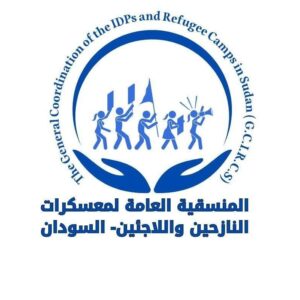
Sudan Sawa Sawa – October 13, 2025
The General Coordination of Camps for Displaced Persons and Refugees has called on all displacement and refugee camps to organize peaceful marches in support of the historic conviction issued by the International Criminal Court (ICC) against Ali Kushayb, the leader of the Janjaweed militias in Darfur, on Monday, October 13, 2025.
The coordination described the conviction as a significant milestone in achieving justice and redress for the victims—something the Sudanese judiciary has failed to accomplish over the years. It emphasized that ensuring justice, prosecuting perpetrators, and handing over all individuals wanted by the ICC are essential steps toward delivering justice for the victims of the former National Congress regime and establishing a just, comprehensive, and lasting peace in Sudan.
The statement from the General Coordination stressed the following points:
1/ To those who believed they were untouchable and could escape accountability: the era of impunity is over. No matter how long it takes, justice will ultimately prevail for the victims, the oppressed, and the poor.
2/ The conviction of Ali Kushayb marks the beginning of a series of trials and confirms that crimes of genocide, ethnic cleansing, crimes against humanity, and war crimes were indeed committed in Darfur—threatening national, regional, and international security.
3/ This verdict is not just an ordinary event; it is a reflection of reality and a renewed source of hope for victims who continue to find solidarity from the international community, even more than two decades later.
4/ The coordination vowed to continue its efforts until all remaining fugitives with ICC arrest warrants surrendered, including former president Omar Hassan Ahmad al-Bashir, Abdel Rahim Mohammed Hussein, Ahmed Mohamed Haroun, and others.
Yagoub Mohamed Abdullah (Furi)/
General Coordinator of Camps for Displaced Persons and Refugees
“Justice Prevails in The Hague: Darfur Victims Celebrate Conviction of Ali Kushayb, Call for Prosecution of Al-Bashir and Other Perpetrators”
Sudan Sawa Sawa – October 11, 2025
In an emotional scene where tears of joy mixed with memories of pain, victims of the war in Darfur and across Sudan expressed profound satisfaction with the historic verdict issued by the International Criminal Court (ICC) on Monday, October 6, 2025. The court found militia leader Ali Kushayb guilty of war crimes and crimes against humanity, marking a milestone in the pursuit of international justice and a new chapter of hope for victims of conflict in Sudan, particularly in Darfur.
Speaking to Sudan Sawa Sawa, Yagoub Abdullah Furi, General Coordinator of the Darfur Victims Association, described the ruling against Kushayb as “only the beginning of a long road toward achieving full justice for all victims.”
In a statement, he noted that “the crimes being committed in Sudan today do not even amount to 2% of the atrocities perpetrated by the former Islamist regime,” adding that the verdict represented a long-awaited moral and historical vindication for the Sudanese people.
A Message of Gratitude to the ICC and Prosecutors:
Furi extended his deep appreciation, through Sudan Sawa Sawa, to the International Criminal Court and all those who contributed to securing the conviction, especially former and current ICC prosecutors Luis Moreno Ocampo, Fatou Bensouda, and Karim Khan, for their unwavering efforts in pursuing justice and holding perpetrators accountable.
“We once thought the world viewed us the same way the Sudanese government did, seeing us as ‘insects,’” the statement read. “But the trial of Ali Kushayb has proven that the world stands with the oppressed, and that justice, no matter how delayed, cannot be escaped.”
Justice Through Law, Not Revenge:
The coordinator emphasized that Kushayb’s conviction is a victory not only for Darfur but for all of Sudan. It strengthens victims’ faith in the power of legal justice over vengeance and stands as proof that the world has not forgotten the crimes committed. “No criminal will go unpunished, no matter how long it takes,” the statement affirmed.
Furi further stressed that justice is indivisible, calling for the prosecution of other key figures implicated in the Darfur atrocities, including:
– Omar al-Bashir
– Abdul Rahim Mohammed Hussein
– Ahmed Haroun
He urged the ICC to open all case files related to crimes in Darfur and across Sudan, not only those concerning Wadi Salih and Central Darfur, since the atrocities extended to many other regions that endured equal suffering.
Readiness to Provide Evidence and Witnesses:
Furi confirmed that representatives of the victims are fully prepared to provide evidence and witness testimonies at any time and place before the ICC. He highlighted that years of documentation and evidence-gathering by victims and activists were instrumental in helping the court uncover the truth.
Appreciation for The Hague and the International Community:
Victims also extended heartfelt thanks to the Netherlands, particularly to The Hague, the seat of the International Criminal Court, for its enduring support of international justice. They described the city as “a symbol of fairness and a beacon of hope for oppressed people everywhere.”
Justice Restores Hope:
The statement concluded with a message of hope to all Sudanese:
“Today, we rejoice because justice has finally recognized our suffering and restored our faith in a future where peace and security prevail. We call on all victims across Sudan never to accept injustice and to continue striving for accountability for every crime committed against innocent civilians.”
“Kalma Camp for the Displaced in Darfur: Over Two Decades of Suffering and Renewed Calls for Humanitarian Support”
Sudan Sawa Sawa – October 10, 2025
Yagoub Mohamed Abdullah, known as Furi, the General Coordinator of Camps for the Displaced and Refugees, expressed his deep gratitude to the Sudan Sawa Sawa network and all media representatives who visited Kalma Camp. He praised their efforts to highlight the ongoing suffering of displaced people since 2004.
Speaking to Sudan Sawa Sawa, Yagoub said “the hardships persist even after more than twenty years of displacement. He noted that the displaced have endured death, destruction, and injuries, and despite past attempts by authorities to erase their existence, they have persevered and borne their suffering in silence.”
Humanitarian and Health Conditions:
Yagoub emphasized that displaced families continue to face a lack of livelihood opportunities, poor basic services, and shortages of clean drinking water. He recalled that Kalma Camp came under a violent attack in 2008, resulting in the deaths of more than 118 people and injuries to around 120 others from various weapons.
Another attack took place in 2017 during former president Omar al-Bashir’s visit to Bileil locality, near Nyala in South Darfur, leaving many women, children, and young people dead, and 46 others seriously wounded.
Despite these tragedies, health services continue to operate in the camp through organizations such as the Humanitarian Aid Commission, Médecins Sans Frontières (Doctors Without Borders), and the Health Insurance Center. Although much of Darfur’s infrastructure has been damaged, the youth and workers in the camp continue their efforts to provide essential services.
Education and Security:
Yagoub reported that education within the camp faces a severe shortage of resources. Out of 27 schools in Kalma Camp, only two have reopened so far. He stressed the urgent need for quick intervention to reopen the remaining schools and ensure that displaced children can continue their education.
Regarding security, Yagoub noted a relative improvement compared to previous years. He said that young people are now more aware and have overcome the divisive rhetoric of racism that once existed, focusing instead on protecting citizens regardless of political or tribal affiliations.
Voices from the Camp:
Hawa Adam, a displaced woman living in Kalma Camp, told Sudan Sawa Sawa that conditions are “very poor.” She explained that people are surviving on “dried porridge,” a local expression referring to insufficient or meager food.
Similarly, another displaced person, Musa Yunis, said “he has no source of income and is solely responsible for providing for his children, a burden that deepens the daily struggles of his family.”
Coordination Activities and the Role of Organizations:
The general coordination office oversees 175 camps for displaced persons across Darfur. According to Yagoub, all these camps face conditions similar to those in Kalma, disease outbreaks, service shortages, and water scarcity.
He mentioned that a cholera outbreak swept through the camps during July, August, and September this year, but vaccination campaigns conducted by humanitarian organizations helped bring the epidemic largely under control.
Yagoub appealed to humanitarian agencies to support the reopening of schools within the camps, expand healthcare services, and improve water and sanitation infrastructure.
Call to Authorities and the International Community:
Yagoub urged local authorities to protect farmers and their property as the harvest season approaches and to prevent attacks on farms or livestock trespassing.
He warned that some groups continue to spread hatred and exploit instability to incite violence, calling for decisive action against anyone involved in drug trafficking or criminal activities.
Concluding his remarks, Yagoub said:
“Here in Kalma Camp, we continue to stand firm. We will support all those who strive for peace, justice, and dignity for the displaced people of Darfur.”
“Armed Robbery Surge Deepens Security and Livelihood Crisis in Bendasi, Central Darfur”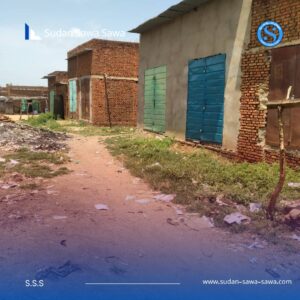
Sudan Sawa Sawa – 21 September 2025
The locality of Bendisi in Central Darfur is witnessing a rapidly deteriorating security situation, marked by a rise in armed robberies and attacks targeting civilians and traders—both within residential areas and along key roads connecting neighboring towns. Residents have been living in a state of fear and anxiety for over two years amid a lack of effective security responses.
Coordinated Robbery Incidents:
According to eyewitnesses who spoke to Sudan Sawa Sawa Network, three separate armed robbery incidents took place across Bendasi on Friday, 19 September 2025. The attacks were reportedly carried out by armed groups, some of whose members were dressed in uniforms resembling those of the Rapid Support Forces (RSF):
1. Within Bendisi (Between Upper and Lower Bendisi):
A civilian, Musa Kasi, was violently assaulted by an armed group. He was robbed of 3 million Sudanese pounds (commonly referred to locally as “three billion”). He sustained serious injuries and was transferred outside the locality for urgent medical treatment.
2. Bendisi–Garsila Road:
Armed men driving a Land Cruiser intercepted several traders, robbing them of both money and goods. Two traders, Hamoudi Yasser and Hamdi Mano, were subjected to severe physical abuse.
3. Bendisi–Mukjar Road:
A civilian riding a motorcycle and carrying 2 million Sudanese pounds was ambushed by two armed men on motorbikes. He was beaten and robbed of the full amount.
Economic and Social Fallout:
Residents have confirmed that the persistent security vacuum has had a devastating effect on Bendisi’s local economy. Commercial activity has sharply declined, as traders now avoid travel due to the risks along key routes. This has led to a critical shortage of essential goods and a steep rise in prices.
Eyewitnesses also highlighted the near-total absence of security forces on commercial roads, which they say is exacerbating the crisis and leaving communities increasingly isolated from both economic and essential services.
Urgent Call for Intervention:
Bendisi residents are urgently appealing to government authorities and international human rights and humanitarian organizations to intervene. They are calling for immediate measures to ensure their safety, secure trade routes, and bring an end to the ongoing threats to their lives and livelihoods.
“Cholera Cases Surge in East Jebel Marra – Darbat Amid Deteriorating Medical Services”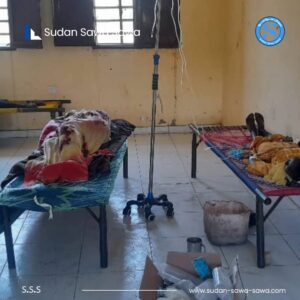
Sudan Sawa Sawa – September 12, 2025
The health situation in Darbat, located in eastern Jebel Marra, is rapidly deteriorating as a cholera outbreak spreads at an alarming rate. This surge comes amid a collapsing local healthcare infrastructure and an almost total absence of international humanitarian organizations, according to Sudan Sawa Sawa’s local correspondent.
Alarming Figures and Escalating Crisis:
Reports from the Health Office of the Civil Administration in the Dira district confirm a significant rise in cholera cases over recent days, with several civilian deaths already recorded. While precise statistics remain difficult to obtain, local indicators point to a worsening public health emergency.
The crisis is compounded by a severe shortage of qualified health centers and a critical lack of basic medical supplies. With no external aid in sight, residents have been forced to rely on limited local initiatives that are ill-equipped to handle the scale of the outbreak.
Urgent Call for Humanitarian Intervention:
Health authorities and local residents have issued urgent appeals to humanitarian organizations and donor agencies to respond immediately. They are calling for the deployment of specialized medical teams, the provision of essential medicines and IV fluids, and the establishment of well-equipped isolation centers to contain the disease’s spread.
They also stressed the importance of launching public health awareness campaigns for both local communities and displaced populations, especially regarding cholera prevention. The absence of clean drinking water and worsening environmental conditions further exacerbate the crisis, creating fertile ground for the spread of the disease and endangering the lives of thousands.
Looming Humanitarian Catastrophe:
Observers warn that failure to address this outbreak could lead to a large-scale humanitarian disaster in eastern Jebel Marra. The situation demands urgent international intervention to provide critical medical and humanitarian support.
“Heavy Rains Isolate Villages in Eastern Jebel Marra, Worsening Humanitarian Conditions”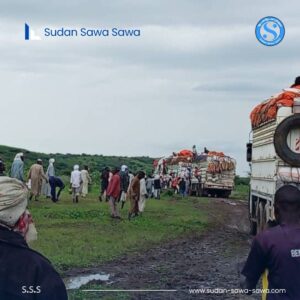
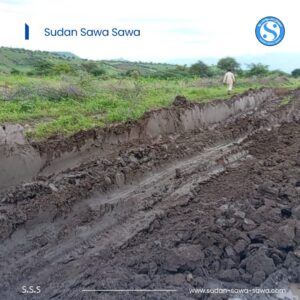
Sudan Sawa Sawa – September 11, 2025
Local communities in eastern Jebel Marra are facing increasingly dire humanitarian conditions as heavy rainfall continues to batter the region, exacerbated by the area’s rugged terrain. The downpours have triggered rockfalls and landslides across several villages, most notably in Tureni Village, cutting off numerous areas from their surroundings.
According to Sudan Sawa Sawa’s correspondent, the torrential rains have severely damaged the rural road network, leaving vehicles stuck in mud and bringing transportation to a standstill. This has significantly hindered the marketing of agricultural products, particularly fruits, causing substantial losses for local farmers.
Several villages have become completely isolated, obstructing access to humanitarian aid, healthcare, and education services. With no emergency solutions in place, reaching some areas is now only possible on foot or by using animals.
Local communities are urgently calling on the relevant authorities and humanitarian organizations to intervene through:
– Repairing and upgrading rural roads to ensure accessibility throughout the rainy season.
– Constructing small bridges and crossings to reduce the risks of landslides and isolation.
– Ensuring the delivery of essential aid and services to affected populations.
Furthermore, residents warn that the situation could deteriorate further if the rainy season continues without effective and sustainable interventions to protect lives and livelihoods.
“Escalation of Human Rights Violations in Bindisi: Sexual Assaults, Looting, and Corruption Deepen Civilian Suffering”
Sudan Sawa Sawa, September 9, 2025
The town of Bindisi – Central Darfur and its surrounding areas are witnessing a deteriorating humanitarian situation amid a sharp rise in violations committed by armed militias, with growing complaints from civilians and internally displaced persons (IDPs).
According to local sources who spoke to Sudan Sawa Sawa, two girls: Hawa Hussein Adam Juma and Amina Khalil Al-Tabin, were sexually assaulted by four armed men carrying Kalashnikov rifles while returning from their farms to their homes in the area between Amar Jeed and Kabouk on August 7, 2025.
The sources further reported a recent surge in attacks against civilians, including widespread street robberies targeting mobile phones, random beatings, home invasions, and theft of personal property.
In a related development, the Rapid Support Forces (RSF) have issued a directive requiring farmers to pay what has been described as “exorbitant taxes” in exchange for protection during the agricultural season. This measure has provoked widespread resentment among farmers and significantly worsened their hardship.
Meanwhile, citizens have criticized the performance of some humanitarian organizations, particularly C.R.S., accusing it of mismanaging aid distribution in an unfair and non-transparent manner. These allegations have fueled concerns about growing corruption in the distribution of aid cards and humanitarian assistance.
Eyewitnesses told Sudan Sawa Sawa that the distribution committee appointed by the organization included local security officials, who allegedly used their positions to divert portions of the aid, including sacks of sorghum and mosquito nets, for personal gain. Instead of distributing items such as mosquito nets on an individual basis, they were handed out per household, leaving large families — some with over 20 members — without adequate supplies.
Sources confirmed that this pattern of corruption in aid distribution has been recurring in Bindisi, with no effective solutions implemented so far. This has further exacerbated the humanitarian crisis facing civilians and IDPs, prompting renewed calls for urgent intervention by humanitarian organizations and relevant authorities to ensure fair and equitable access to aid.
“Rising Sexual Violence in Hamidiya Camp Deepens the Suffering of Displaced People in Central Darfur”
Sudan Sawa Sawa – September 3, 2025
The humanitarian situation in Hamidiya Camp, located in Central Darfur, is deteriorating rapidly amid a sharp increase in sexual violence. According to the Women’s Protection Unit at the camp, 290 cases of sexual assault have been recorded since the outbreak of war on April 15, 2023, up to early September.
The data reveals that 190 of the victims were girls, while 101 adult women were also subjected to similar violations. Additionally, there have been reported cases involving children aged between 12 and 15 years.
Root Causes of the Crisis:
Local reports obtained by Sudan Sawa Sawa indicate that most of the assaults occur when women and girls leave the camp to reach farmlands or firewood collection areas, where there is little to no security presence. This pattern underscores the fragile security situation surrounding the camps, leaving women particularly vulnerable due to their vital roles in securing food and fuel for their families.
Social and Economic Impacts:
The repeated assaults have forced many families to stop their daughters from going to farms, significantly undermining food security within the camp and increasing reliance on humanitarian aid. Beyond the economic toll, the survivors and their families are grappling with severe psychological trauma and social stigma.
Local Responses and Support Efforts:
The Women’s Protection Unit continues to document cases and offer psychosocial and legal support to survivors. However, the unit has emphasized that local efforts are insufficient without urgent intervention from international humanitarian organizations to ensure the safety of displaced populations and strengthen security mechanisms around the camps.
A Call for Urgent Action:
The escalating violations pose not only a direct threat to women and girls, but also a broader risk to the social and economic fabric of the displaced communities, jeopardizing overall humanitarian stability in Darfur. The situation calls for a comprehensive response that integrates security, psychological support, and economic empowerment for survivors and their families.
“Over 230 Cases of Sexual Violence Reported at Hassahissa IDPs Camp in Zalingei”
Sudan Sawa Sawa – August 29, 2025
Following the outbreak of war in Sudan on April 15, 2023, the city of Zalingei in Central Darfur witnessed a major military collapse on October 31, 2023, after Rapid Support Forces (RSF) seized control of Sudanese army positions. In the aftermath, the Hassahissa camp for internally displaced persons, located near the army’s headquarters, was subjected, resulting in grave human rights violations against civilians.
Eyewitnesses told Sudan Sawa Sawa that the raid was accompanied by widespread sexual violence, including direct rape of women and girls inside the camp. Despite the presence of the Sudanese army in the vicinity, there was little to no intervention.
A camp official, who spoke on condition of anonymity for security reasons, confirmed that these violations have continued since the RSF took control and were still ongoing at the time of reporting. She revealed that more than 230 cases of sexual assault have been documented within Hassahissa camp alone.
These accounts highlight the dire humanitarian and security situation facing displaced populations in Darfur amid a total absence of official protection. The ongoing violence calls for urgent international intervention and action by human rights organizations to document these crimes and ensure accountability for those responsible.
“WHO Urged to Intervene as Cholera Outbreak Hits Darfur, Thousands Infected and Death Toll Rises”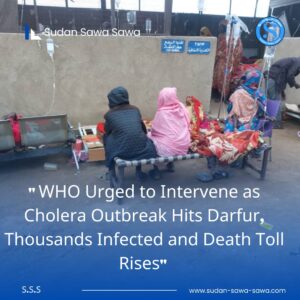
Sudan Sawa Sawa – August 23, 2025
The official spokesperson for the General Coordination of Displaced Persons and Refugees, Adam Rojal, has reported a concerning escalation of cholera cases in Darfur, particularly in the camps in Tawila, Jebel Marra, Nyala, Zalingei, and the Shaeria locality in the Khazan Jadeed. The daily number of cholera cases is surging in displacement centers. In Tawila, most cases are concentrated in the camps, while others are spread across Martal in the south of Tawila and the Tabra area. Since the outbreak, there have been a cumulative total of 4,592 cases, including 75 deaths. Currently, there are 76 active cases in isolation centers, with 55 new cases reported today.
The outbreak has spread further to the Tabra area, which has recorded 178 cases to date. The epidemic has also reached the Rubaya and Tebessa areas, with a cumulative total of 209 cases, including 13 deaths and 15 new cases today. In Jebel Marra, the cholera has extended to other areas, such as Golo, which has reported 1,172 cases, including 51 deaths and Joldo, with 80 cases and nine deaths. Nierteti has seen 41 cases and four deaths, while Rokro has reported 111 cases and seven deaths. Fanga has had 60 cases with three fatalities. In Darbat, east of Jebel Marra, there have been 149 cases and nine deaths. Presently, 47 people are in isolation centers. Two confirmed cholera cases have also been recorded in the Feina region.
The outbreak has spread to the Sortoni camp, where 57 cases, including six deaths, have been reported. The Korma camp has seen 435 cases, with 64 deaths, while Atash camp has recorded 207 cases, including 51 fatalities. In Dreij camp, 117 cases and four deaths have been reported, along with other cases from the Al-Salam camp. In East Darfur, in Shaeria locality near Khazan Jadeed, the cumulative number of cases has reached 85, including 18 deaths.
The cholera outbreak continues to spread in Zalingei. At the Hamidiya and Hassahissa camps, there have been 75 cases and two deaths. The Khamsa-Daqiq camp has recorded three cases, with one fatality. In Azum, west of Zalingei, 109 cases and two deaths have been reported. Zalingei itself has recorded 89 cases, while the agricultural dam area east of Zalingei has seen two cases, and Orkom, south of Zalingei, has had four cases.
The total number of cholera cases in Darfur has surpassed 7,538, including 322 deaths. The epidemic continues to spread rapidly in various regions, particularly Tawila, Jebel Marra, Zalingei, Nyala, and Khazan Jadeed in Shaeria locality, and in numerous displacement camps, where the disease is spreading at unprecedented rates. Despite shortages in medical supplies and isolation centers, humanitarian organizations, local volunteers, emergency response teams, and local authorities are exerting tremendous efforts to combat the disease. However, significant challenges remain, with infection rates continuing to rise, threatening lives and constituting an ongoing, often overlooked humanitarian crisis in a war-torn country already grappling with famine and disease.
The international community, especially the World Health Organization (WHO), is urged to take immediate and effective measures to address this public health and humanitarian emergency that is devastating the displaced population in Darfur.
“Family Tragedy in Mukjar: Three Months Searching for Missing Son Abdel-Salam Adam Abdullah”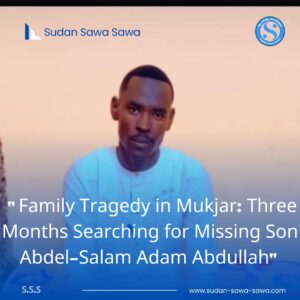
Sudan Sawa Sawa – August 22, 2025
Adam Abdullah Musa, a displaced resident from the village of Kudodo in Mukjar locality, Central Darfur, shared with Sudan Sawa Sawa the harrowing story of his eldest son’s disappearance amid the ongoing conflict. Abdel-Salam Adam Abdullah Musa, 27, has been missing for over three months, with no information on his whereabouts.
Background on the Missing Person:
Born in 1997, Abdel-Salam was the eldest of his siblings. His father, a farmer, worked hard to ensure his education, eventually enrolling him in West Nile Private University in Omdurman. After graduating, Abdel-Salam married the daughter of Kalthoum Abdullah (his father’s siblings) and lived with her in the Salha neighborhood of Omdurman.
He worked alongside his uncle, Taher Ismail, at the Libya Market in Omdurman, near the police station. Within his family, Abdel-Salam was seen as a role model and the main breadwinner, supporting his parents and siblings with their daily needs.
Details of the Disappearance:
According to his father, Abdel-Salam left home one day to buy food but was arrested on his way back. He spent nine days in detention before being released. During that time, he sent brief messages to reassure his father.
After his release, he traveled to the Mayo area in southern Khartoum to meet his wife — and from that moment on, he disappeared without a trace. Despite relentless efforts by the family to locate him, no information has emerged regarding his fate.
The Family’s Ordeal:
Abdel-Salam’s mother, Maryam Adam Abdullah, is suffering from severe emotional distress. She reportedly faints every time she hears that her son’s fate remains unknown. The family believes he might be held in one of the prisons, such as Soba, Bahri, or Kober.
His father says “I live in constant confusion and helplessness, unsure where to turn next in the search for my son.”
Plea for Help:
The family is appealing to all media outlets, human rights organizations, humanitarian agencies, and the warring parties to assist in uncovering Abdel-Salam’s fate — whether he is alive or deceased — so they can bring an end to their prolonged agony and uncertainty.
“Emergency Rooms in Rongatas, East Nile, and Doha Camps Launch Environmental Sanitation Campaign to Combat Disease Vectors”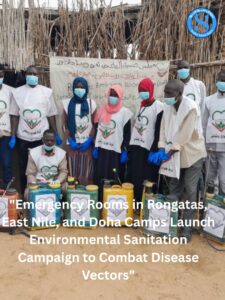
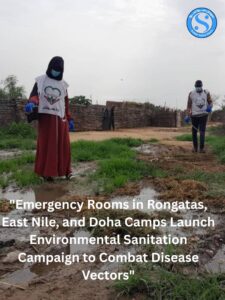
Sudan Sawa Sawa – August 21, 2025
In an effort to promote public health and mitigate environmental risks, the Emergency Coordination Rooms of the Rongatas, East Nile, and Doha camps in Central Darfur have launched a wide-scale environmental sanitation campaign aimed at eliminating pollution hotspots and controlling disease vectors.
The campaign involved extensive cleaning operations, preventive spraying, and the removal of waste that serves as breeding grounds for disease-carrying insects. These activities were carried out with the active participation of field teams, volunteers, and members of the local community.
Organizers of the campaign stated that the initiative is part of a comprehensive plan to safeguard communities from health hazards. They emphasized the importance of cooperation between official bodies and the public to ensure a clean and safe environment.
“Cholera Outbreak in Northern Nyala: Youth-led Initiatives Mobilize to Save Lives”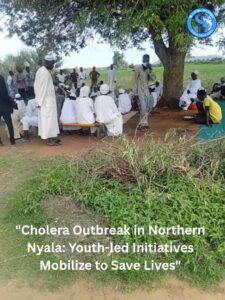
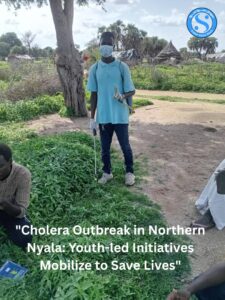
Sudan Sawa Sawa – August 20, 2025
Amid the ongoing conflict and its devastating consequences in South Darfur State, health conditions have sharply deteriorated in the northern regions of Nyala. Local reports confirm a growing cholera outbreak in areas such as Solba, Sarman Jago, Tana, Yara, and many of the rural parts of Mershing locality.
Residents are facing a severe shortage of medical supplies and essential medicines, further compounding the crisis and putting hundreds of lives at risk—especially in the absence of properly equipped health centers to handle emergency cases.
Local Initiative to Rescue Patients:
Despite these challenges, local youth from the affected areas have launched a grassroots initiative aimed at:
– Educating citizens on how to prevent cholera infection;
– Organizing disinfection campaigns targeting homes, streets, and water sources;
– Raising community awareness about the dangers of cholera and how to curb its spread.
The initiative emerged in response to the lack of sufficient official support, with volunteers relying on limited resources and self-driven efforts to contain the outbreak.
Call for Support and Solidarity:
Organizers of the campaign have issued an urgent appeal to members of the community—both inside and outside Sudan—to provide financial and logistical assistance to sustain the on-ground efforts and help save lives. They also called for renewed solidarity and collective action during this critical period, emphasizing the need for united efforts to overcome the health crisis.
“Darfur Faces Cholera Outbreak: A Deteriorating Health Crisis and Rising Daily Cases”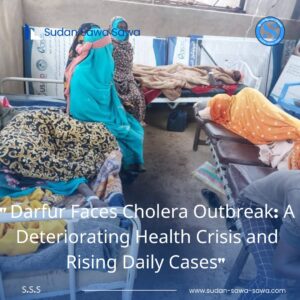
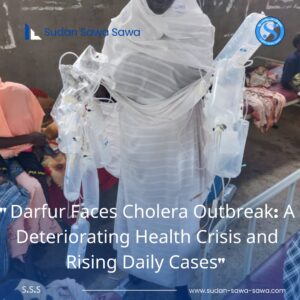
Sudan Sawa Sawa – August 19, 2025
The cholera outbreak in Darfur—particularly in the regions of Tawila, Jebel Marra, Nyala, Zalingei, and Shaeria locality (specifically the Khazan Jadeed area)—is witnessing an alarming rise in daily reported cases across displacement camps.
In Tawila, the majority of cases are concentrated in the camps, with additional cases reported in Martal (south of Tawila) and Tabra. Since the outbreak began, the cumulative number of cases has reached 4,420, including 73 deaths. Currently, 89 patients are being treated in isolation centers, and 75 new cases were recorded today alone.
In Tabra, the cumulative number of cases has reached 178, while in Rubaya, the outbreak has led to 19 cumulative cases.
The epidemic has also spread to various parts of Jebel Marra, including:
– Golo: 1,028 cases, including 51 deaths
– Joldo: 79 cases, including 8 deaths
– Nierteti: 20 cases, including 4 deaths
– Rokro: 111 cases, including 7 deaths.
– Darbat (East Jebel Marra): 149 cases, including 9 deaths
– Feina: 2 confirmed cases. There are currently 47 patients in isolation centers in this region.
– In Sortoni camp, 36 cases have been recorded, including 2 deaths.
In South Darfur:
– In Kalma camp, the cumulative number has reached 435 cases, including 64 deaths.
– In Otash camp, 204 cases have been reported, with 50 deaths.
– In Dereige camp, 117 cases have been confirmed, including 4 deaths. Additional cases have been reported in the Salam camp.
In East Darfur, specifically in the Khazan Jadeed area of Shaeria locality, 68 cases have been recorded since the outbreak began, with 18 deaths.
The outbreak has also continued its spread to Zalingei. In Hamidiya and Hassahissa camps, there have been 75 cumulative cases, including 2 deaths.
In Khamsa Degaig camp, 3 cases have been recorded, including one death.
In Azum (west of Zalingei), 109 cases have been confirmed, including 2 deaths.
In Zalingei town, there have been 89 cases to date.
In the Kombo Weir agricultural area (east of Zalingei), 2 cases were reported, while in Orkom (south of Zalingei), 4 cases have been confirmed since the outbreak began.
As of now, the total number of cholera cases reported across Darfur has surpassed 7,011, including 305 deaths.
The epidemic continues to spread across many parts of Darfur—particularly in Tawila, Jebel Marra, Zalingei, Nyala, Khazan Jadeed (Shaeria locality), and displacement camps—at an unprecedented rate. Despite severe shortages of medical supplies and isolation centers, humanitarian organizations, local volunteers, emergency response rooms, and local authorities are making tremendous efforts to contain the disease.
However, significant challenges persist due to the rapid rise in infections and limited capacity to respond. This situation poses a grave threat to lives and represents a forgotten humanitarian catastrophe.
We call on the World Health Organization and all relevant institutions to take urgent and effective measures to address this critical public health and humanitarian emergency facing displaced communities across Sudan.
“Mukjar Emergency Room Launches Environmental Sanitation Campaign in Central Darfur to Combat Cholera and Mosquitoes”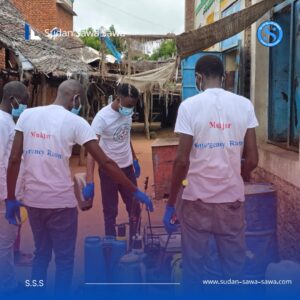
Sudan Sawa Sawa – August 18, 2025
The Mukjar Emergency room in Central Darfur has launched a comprehensive environmental sanitation campaign with wide participation from local residents. The initiative targeted street cleaning, disinfecting stagnant water sites, and clearing waste disposal areas.
The campaign also included awareness-raising activities aimed at promoting public health and disease prevention.
The initiative seeks to reduce the risk of cholera outbreaks and mosquito-borne illnesses while also fostering community engagement in improving the local environment.
#Mukjar #EmergencyRoom #EnvironmentalSanitation
#Sudan #MukjarSudanSawaSawa
“Rising Malnutrition Among Children in Mukjar, Central Darfur Amid Escalating Food and Medicine Shortages”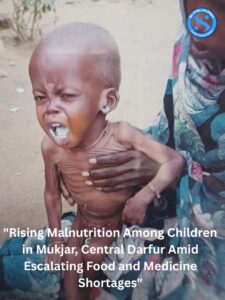
Sudan Sawa Sawa – August 18, 2025
The Sudan Sawa Sawa’s camera has highlighted a significant increase in malnutrition cases among children in the Mukjar locality of Central Darfur.
This surge is attributed to the ongoing severe food shortages and the absence of medical supplies and health aid. The situation is raising growing concerns about the worsening humanitarian crisis, underscoring the urgent need for enhanced efforts to provide food and medical assistance to the affected families.
#Malnutrition #Mukjar_locality
#SawSawaCamera
“Cholera Outbreak in Darfur: Over 6,900 Cases and 297 Deaths Amid Critical Humanitarian Conditions”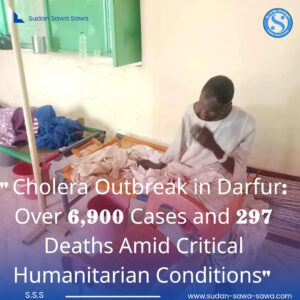
Sudan Sawa Sawa – August 17, 2025
A cholera outbreak in Darfur is escalating rapidly, particularly in the areas of Tawila, Jebel Marra, Nyala, Zalingei, and Shaeria locality in the Khazan Jadeed area. The daily number of recorded cases is rising alarmingly, especially in displacement camps.
In Tawila, the majority of cases are concentrated in the camps, with others reported in Martal (south of Tawila) and Tabra. Since the outbreak began, Tawila has reported a cumulative total of 4,377 cases, including 73 deaths. Currently, 113 patients are receiving treatment in isolation centers, with 75 new cases recorded today alone.
In Tabra, the total number of cases has reached 128, while the Rubaya area has reported 19 cases since the outbreak began.
The epidemic has also spread to other parts of Jebel Marra:
– Golo: 1,028 cases, including 51 deaths.
– Joldo: 75 cases, including 8 deaths.
– Nierteti: 20 cases, including 4 deaths.
– Rokro: 86 cases, including 5 deaths.
– Deira, Darbat, and Eastern Jebel Marra: 113 cases, including 9 deaths
Currently, 47 patients are in isolation in this region. Two confirmed cholera cases have also been reported in the Feina area.
– In the Sortoni IDPs camp, 32 cases have been recorded, including 2 deaths.
Other camps in South Darfur have been hit hard:
– Kalma IDPs Camp: 435 cases, including 58 deaths.
– Otash Camp: 202 cases, including 50 deaths.
– Dereige Camp: 117 cases, including 4 deaths
Additional cases have also been reported in the Salaam Camp.
In East Darfur, within Shaeria locality’s Khazan Jadeed area, 62 cases have been recorded, including 18 deaths.
Zalingei has also seen a growing number of cases. In the Hamediya and Hassahissa camps, a total of 75 cases have been reported, with 2 deaths. The Khamsa Degaig Camp has reported 3 cases, including one death.
In the Azum area, west of Zalingei, 109 cases have been reported, including 2 deaths. Zalingei town itself has registered 89 cases, while the Kombo Weir agricultural area (east of Zalingei) has reported 2 cases, and Orkom (south of Zalingei) has seen 4 cases since the outbreak began.
In total, the cumulative number of cases in Darfur has surpassed 6,909, with 297 deaths recorded.
The outbreak continues to spread across many parts of Darfur, particularly in Tawila, Jebel Marra, Zalingei, Nyala, Khazan Jadeed, and several displacement camps, with infection rates reaching unprecedented levels.
Despite severe shortages of medical supplies and isolation centers, humanitarian organizations, local volunteers, emergency response teams, and local authorities are making significant efforts to combat the disease. However, they face immense challenges due to the rapid increase in cases and limited capacity to control the spread. The situation poses a grave threat to public health and is fast becoming a humanitarian catastrophe.
There is an urgent appeal to the World Health Organization (WHO) and other relevant international bodies to take swift and effective action to address this escalating health and humanitarian crisis affecting displaced communities in Sudan.
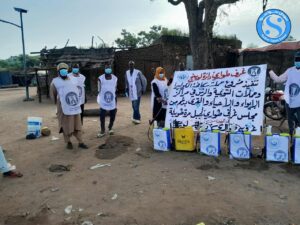 The Liwienj Emergency Room has intensified its efforts to combat the cholera outbreak by launching wide-scale spraying campaigns in the Liwienj area of Jebel Marra. This initiative is part of ongoing efforts to curb the spread of the disease and reflects the commitment of health and community authorities to safeguarding citizens and strengthening preventive response measures.
The Liwienj Emergency Room has intensified its efforts to combat the cholera outbreak by launching wide-scale spraying campaigns in the Liwienj area of Jebel Marra. This initiative is part of ongoing efforts to curb the spread of the disease and reflects the commitment of health and community authorities to safeguarding citizens and strengthening preventive response measures.
#Cholera_JebelMarra
#SprayingCampaigns_Liwienj
#SawaSawa #Sudan
“Sudan Sawa Sawa Monitors Consumer Goods Prices in Mukjar Locality”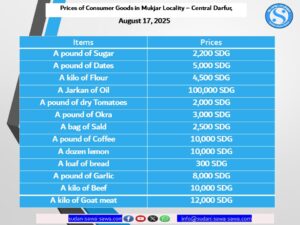
Sudan Sawa Sawa – August 17, 2025
As part of its ongoing efforts to monitor market activity and provide a clear picture of the living conditions of citizens, Sudan Sawa Sawa has conducted a survey of consumer goods prices in Mukjar Locality, located in Central Darfur State.
#Mukjar – Central Darfur State
#Consumer_Goods_Prices
#SawaSawa #Sudan
“Sudan Sawa Sawa Monitors Economic Conditions in Kalma IDPs Camp, South Darfur”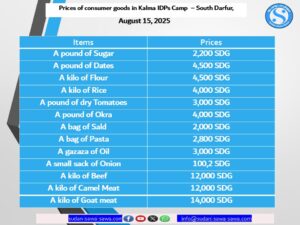
South Darfur: Sudan Sawa Sawa, August 15, 2025
Sudan Sawa Sawa has documented the current economic situation in Kalma Camp for internally displaced persons (IDPs) in South Darfur, highlighting the latest prices of essential consumer goods.
This monitoring effort aims to raise awareness within the local community and provide accurate, up-to-date information to support ongoing humanitarian and relief efforts.
#SawaSawa_Kalma_Economic_Situation
#Sudan #EssentialGoods
“Price Disparities in Consumer Goods Observed in Kass, South Darfur Amid Market Monitoring”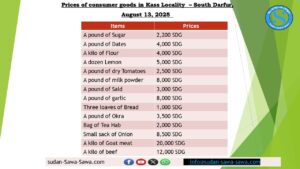
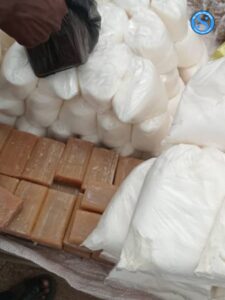
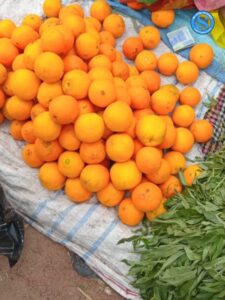
Sudan Sawa Sawa – August 13, 2025
Sudan Sawa Sawa has monitored the economic situation in Kass locality, South Darfur State, where a noticeable variation in the prices of consumer goods has been observed among different shops. This comes amid ongoing monitoring of market activity and citizens’ needs.
#ConsumerPrices_Kass
#SawaSawaCamera_Sudan
“Cholera Outbreak in Darfur Expands to New Areas Amid Medical Supply Challenges”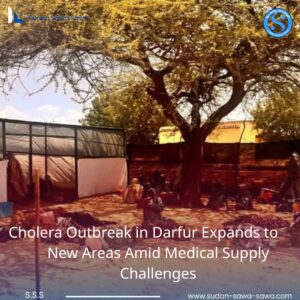
Sudan Sawa Sawa – August 11, 2025
On Sunday, August 10, 2025, Darfur saw a concerning rise in cholera cases, particularly in the displaced persons camps and the regions of Jebel Marra, Nyala, and Zalingei, with the disease continuing to spread rapidly into new areas.
In the Tawila area, the majority of infections were reported in the camps, in addition to Martal in the south of Tawila and Tebara. Since the outbreak began, the cumulative number of cases has reached 3,761, with 71 deaths. Currently, 137 patients are receiving treatment in isolation centers, with 110 new cases recorded today. Cholera has also been detected in Tebara, where 10 cases have been confirmed.
In Jebel Marra, the town of Golo recorded the highest number of infections, with 758 cases, including 49 deaths, followed by Joldo with 61 cases and 7 deaths. Other areas, such as Nierteti, reported 5 cases, Rokro 18 cases (including 4 deaths), and 5 cases are currently in isolation. Additionally, Darbat recorded 19 cases, while two confirmed cases were reported in the town of Feina. In Sortoni camp, 11 cases were reported, including 2 fatalities.
In the Nyala camps, the cumulative total in Kalma reached 435 cases, with 45 deaths, while Atash recorded 191 cases and 49 deaths, and Dreg 103 cases with 4 deaths. Other cases have been reported in the Al-Salam camp. In Zalingei, the Hamidiya camp recorded 9 cases, including 1 death, while the Five Daqiq camp reported 3 cases, including 1 fatality, and Taloulwa recorded 30 cases with 2 deaths. The Komboir Agricultural area has reported 2 cases, and Orkom has reported 4 cases.
As of now, the total number of confirmed cholera cases in Darfur since the outbreak began stands at 5,412, with 235 deaths.
Despite a shortage of medical supplies and a lack of isolation centers, humanitarian organizations, volunteers, and emergency response teams, in cooperation with local authorities, continue to work tirelessly to curb the spread of the disease. Efforts are focused on raising health awareness, providing clean water, and distributing sanitation tools in an attempt to control the epidemic and minimize its impact.
“Cholera Outbreak Spreads in Northern areas of Sortoni Camp for IDPs: Amid Rising Cases Across Darfur”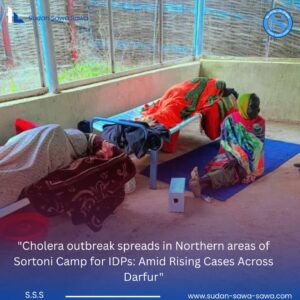
Sudan Sawa Sawa – August 6, 2025
A concerning outbreak of cholera is sweeping through several areas of North Darfur State, amid a severe shortage of medical resources and a growing number of infections and fatalities—particularly in displacement camps and surrounding communities.
Field Situation in Sortoni Camp and Surrounding Areas:
Medical sources and eyewitnesses confirmed to “Sudan Sawa Sawa” that five confirmed cases of cholera have been reported in the “Terinji area“, while three deaths have been recorded in the “Sikher area“, including two children and a 60-year-old woman. Two additional deaths were also reported—one in the “Tawri area,” east of Sortoni Camp, and another inside the camp itself.
A healthcare worker at the Sortoni Health Center told Sudan Sawa Sawa that the situation has become critical. Patients are being treated under dire conditions due to a significant shortage of medical staff and essential supplies.
“We face daily challenges in providing care,” said one doctor working at the center. “an urgent support is needed from humanitarian organizations and emergency response teams to control the spread and prevent further escalation.”
Rising Cholera Statistics Across Darfur:
Recent official data show a continuous surge in cholera cases across multiple areas in Darfur, including:
– Tawila: 3,252 cumulative cases, 67 deaths, and 169 patients currently in isolation. A spike of 58 new cases was recorded in a single day.
Jebel Marra Region:
– Golo: 464 cases, 45 deaths
– Joldo: 45 cases, 7 deaths
– Nierteti: 2 cases imported from Qarni.
South Darfur:
– Kalma Camp: 313 cases, 45 deaths
– Otash Camp: 190 cases, 48 deaths
– Dreij and Al-Salam Camps: New cases have been reported, but specific figures have not yet been confirmed.
Since the onset of the outbreak, the total number of confirmed cholera cases across the Darfur region has exceeded 4,266, with at least 212 deaths. Healthcare facilities continue to struggle under immense pressure, facing severe funding gaps and limited humanitarian response capacity.
Calls for Urgent Action and Shared Responsibility:
In response to the worsening crisis, local authorities and healthcare workers have once again appealed to international and humanitarian organizations for immediate medical assistance—especially for Sortoni Camp, which hosts a large population of internally displaced persons (IDPs).
They emphasized the need for a comprehensive response that includes:
– Supplying health centers with essential equipment and staff.
– Conducting public awareness campaigns on hygiene and water safety.
– Improving access to clean water.
– Establishing properly equipped isolation units to contain the spread
Opportunities for Intervention and Strengthening Response:
Despite the severity of the crisis, local initiatives have played a key role in reporting cases and providing initial support—highlighting an opportunity to strengthen community partnerships and coordinate more effective interventions. These efforts could serve as a foundation for rebuilding the region’s strained healthcare infrastructure.
As the health crisis in Darfur deepens, there is an urgent and growing need for both local and international solidarity to prevent the situation from escalating into a widespread disaster. Ensuring access to healthcare and clean water for all residents remains a collective responsibility—demanding swift, coordinated action from authorities, aid organizations, and local communities alike.
“Cholera Outbreak Escalates in Darfur: Over 3,500 Cases and 149 Deaths Amid Weak Health Response”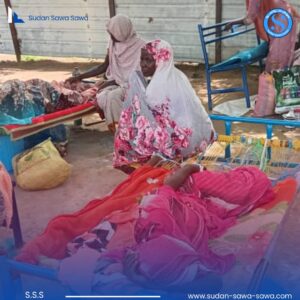
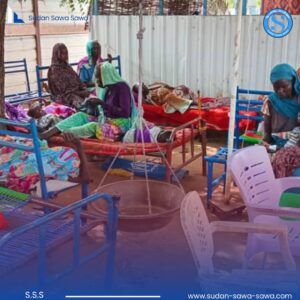
Sudan Sawa Sawa – August 3, 2025
Darfur is witnessing a worrying surge in cholera infections, particularly in displacement camps and overcrowded areas, prompting urgent warnings from health organizations for immediate intervention and improved field response mechanisms.
In Tawila, North Darfur, 64 new cases were reported on Saturday, August 2, 2025, in the Deba Naira camp, bringing the total number of confirmed cases in the area to 2,796 since the outbreak began. The death toll there has reached 52, while 242 patients are currently receiving care at the local isolation center. A total of 172 new admissions were recorded just today, underscoring the severity of the situation and the rapid spread of the disease.
In Martal, 37 new cases were confirmed. Meanwhile, the Jebel Marra region—particularly in Golo and surrounding villages—has also seen a spike in daily infections, with a cumulative total of 211 cases, 203 of which are in Golo alone. This includes 12 deaths, and 61 patients are currently undergoing treatment in isolation.
New cases have also emerged in Nierteti (2 cases) and Joldo (6 cases), highlighting the widening geographic spread of the outbreak. In Kalma camp, a total of 313 cases have been confirmed, with 45 deaths reported. In Atash camp, South Darfur, 190 cases have been recorded, including 40 fatalities. Additional cases have been identified in Dreig and Al-Salam camps, where the health and humanitarian response remains critically under-resourced.
As of now, the total number of cholera cases in Darfur has reached 3,547, including 149 deaths. Medical professionals and community leaders are calling for intensified awareness campaigns and increased support for isolation centers and access to clean water—particularly in densely populated camps.
Urgent Call to Action:
In light of the escalating outbreak, public health experts are urging local and international authorities, as well as humanitarian organizations, to intensify coordination and accelerate emergency response efforts. There is a pressing need for medical supplies, personnel, and improved outbreak management—especially in regions that have shown limited capacity to handle the crisis.
“East Jebel Marra Faces Safe Childbirth Crisis as Healthcare System Collapses”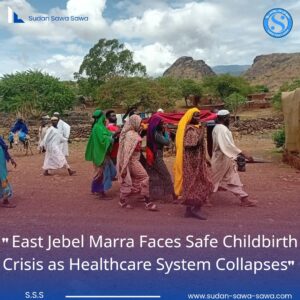
Sudan Sawa Sawa – August 2, 2025
In the Darbat area of East Jebel Marra, childbirth has become a life-threatening ordeal for women, with the absence of basic healthcare turning what should be a natural event into a dangerous struggle for survival.
A Harrowing Journey for Survival: The Story of Rania Ismail, 24
On July 31, 2025, the village of “Karo Salanga” witnessed a distressing example of the region’s deteriorating health conditions. Rania Ismail, a 24-year-old woman, went into labor with no medical facility nearby and no means of transportation available. Her family, desperate to save her, carried her for a long distance on foot to the Darbat health center, hoping to find medical help.
But hope quickly turned to despair. The only hospital in the area has been shut down for months—no staff, no electricity, no equipment. Local women stepped in to assist with the delivery under conditions that lacked even the most basic medical standards. Both Rania and her newborn survived, but their experience exposed the fragile and alarming state of the healthcare system in East Jebel Marra.
A Recurring Crisis Amid Silence:
Rania’s ordeal is not unique. Pregnant women, the sick, and children face daily uncertainty due to the absence of functioning healthcare facilities, a severe shortage of trained medical personnel, and a lack of ambulances or transport options.
Eyewitnesses and local sources confirmed to “Sudan Sawa Sawa’s correspondence” that the health situation in East Jebel Marra continues to deteriorate, as humanitarian organizations have been slow to respond. The crisis is further exacerbated by rising population displacement and the ongoing impact of conflict in the area.
Urgent Calls to Rebuild Trust in the Health System:
Community members and grassroots organizations are calling for immediate intervention by health-focused NGOs to save lives. Their demands include:
-Rehabilitating hospitals and local health centers.
-Deploying mobile emergency medical units.
-Training local medical staff and supplying essential medicines and equipment.
Residents are also urging for a comprehensive response that prioritizes the needs of women of reproductive age and ensures equitable access to healthcare in conflict zones and remote villages.
Despite the daunting challenges, a sense of hope persists, fueled by the resilience and solidarity of local communities. But without serious, sustained intervention, childbirth—an essential human experience—will remain a gamble with life-threatening consequences.
Rebuilding the healthcare system in East Jebel Marra is not just a priority. It is a race against time to protect the lives and future of civilians in the region.
“Popular Initiative Launched to Rehabilitate Darbat Rural Hospital (Women and Maternity Complex) in East Jebel Marra”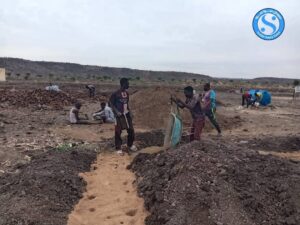
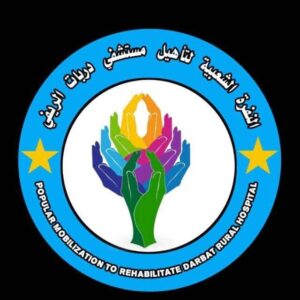
Sudan Sawa Sawa – July 16, 2025
Amid the deteriorating health conditions in the East Jebel Marra areas —specifically in the Dira district—a grassroots initiative has been launched to rehabilitate Darbat Rural Hospital, focusing in particular on the Women and Maternity Complex. The facility had ceased operations due to a severe shortage of medical services and staff.
The initiative, led by local citizens, aims to mobilize both public and official support to complete essential renovation work, which includes:
– Constructing three additional rooms.
– Building three toilets and three bathrooms.
– Erecting three additional shelters.
– Repairing the hospital’s internal electrical system.
– Providing essential medicine supplies.
– Establishing administrative offices and a pharmacy.
– Adding ten new hospital beds.
– Repairing the hospital’s ambulance.
The organizing committee has called on all community members and organizations to support the project through the following bank account:
Bankak Account Number: 2073063
Name: Nouraldin Ahmed Al- Noor Adam
WhatsApp Transection Reference no.+249120401420
Dr. Sabri Ahmed Thameen
This initiative is a swift community response to the ongoing health crisis in the region, amid growing calls for urgent intervention from government bodies and humanitarian organizations to ensure the continuation of life-saving healthcare services.
“Jebel Marra: “Golo” Residents of the “Vegetable Market” Face Catastrophic Health Conditions Due to Lack of Shelter Materials”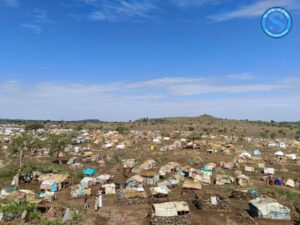
Sudan Sawa Sawa – July 13, 2025
In a scene that encapsulates the suffering of thousands of residents in the Golo area of Jebel Marra, Sudan Sawa Sawa has documented recent images from the central vegetable market, locally known as Zanki al-Khodar in Golo – Jebel Marra. The photos reveal the dire conditions in which both local citizens and displaced people have been living since they fled to the area following the outbreak of the war on April 15, 2025, in various regions of Sudan.
According to Sudan Sawa Sawa’s correspondent reporting from inside the market, the community suffers from a complete lack of basic shelter materials, especially plastic tarpaulins, which are essential for protection during Sudan’s rainy season. Residents confirm that the absence of these materials has worsened health challenges within the market.
“Zanki al-Khodar” has become one of the many informal centers that now serve as makeshift shelters for a large number of displaced families, amid an almost total absence of humanitarian support from both local and international organizations.
The residents have issued an urgent appeal to the authorities and humanitarian organizations to intervene immediately and provide tarpaulins and other essential shelter materials to mitigate the growing health and environmental risks.
It is worth noting that this crisis is part of the escalating humanitarian deterioration in the Darfur region since the war erupted on April 15, 2023, which has led to the displacement of hundreds of thousands and increased the suffering of civilians across various parts of Sudan.
“Displaced Fatima Faces Flooding in Sharga AL Neel Camp, Darfur: A Tragic Start to the Rainy Season”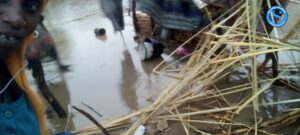
Sudan Sawa Sawa – July 10, 2025
As the rainy season begins, the internally displaced persons (IDP) camp in the Sharga AL Neel, an area of Wadi Azum locality, Central Darfur State, has been hit by sudden flooding during June and July. The floods have exposed the fragility of the camp’s infrastructure and the total absence of basic protective measures for the displaced, who are already living in extremely harsh humanitarian conditions.
Fatima Amin, a displaced mother of five and currently in the final stages of pregnancy, shared her story with Sudan Sawa Sawa. She lives in a simple shelter made of straw and fabric—completely inadequate against wind or rain. Fatima recounted how the first rainfall of the season caught her off guard, leading to severe flooding that swept through her shelter and destroyed her few belongings.
Fatima’s economic situation has drastically deteriorated. She survives on daily informal labor, with no consistent income or adequate relief assistance. Her husband works in a remote area without mobile network coverage, which only deepens her sense of isolation and insecurity.
Fatima’s ordeal reflects the broader reality faced by thousands of displaced families across Darfur. Camps still lack even the most basic necessities for shelter, healthcare, and food, all while climate and humanitarian risks continue to grow.
An Urgent Call for Immediate Action:
Fatima’s story is a dire warning, raising serious questions about the effectiveness of humanitarian response in displacement areas. Her experience highlights the urgent need for safe shelter, specialized healthcare—particularly for pregnant women—and the importance of empowering women economically while strengthening social protection networks.
Importantly, Fatima’s case is not an isolated one. It represents a larger collective suffering, shaped by ongoing conflict and harsh environmental conditions. As rainfall continues and population density in displacement camps rises, immediate action by authorities and humanitarian organizations is no longer optional—it is an urgent necessity.
“Mershing Under Control: Escalating Violations Against Civilians Amid Absence of Accountability in South Darfur”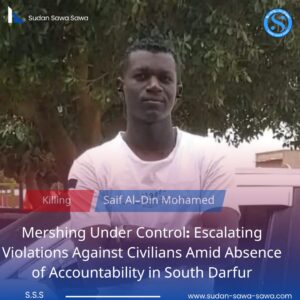
Sudan Sawa Sawa – July 8, 2025
The locality of Mershing, in South Darfur State, is witnessing a concerning deterioration in security conditions amid a sharp rise in serious violations against civilians. These abuses are allegedly being committed by members of the Rapid Support Forces (RSF), starting from June and continuing into recent days.
On Monday, July 7, 2025, two civilians were reportedly killed in separate incidents within Mershing City. At approximately 6:00 p.m., a young girl named Tehani Mohamed Khalid, a university graduate from Faculty of Education at El Geneina University, was killed. And according to local sources and eyewitnesses speaking to Sudan Sawa Sawa, the perpetrators are believed to be affiliated with the Rapid Support Forces.
Later, the same day, 30-year-old Saif Al-Din Mohamed Saif Al-Din was also killed by members of the same force within the city. This occurred amid an atmosphere of fear and tension that residents have been living under for weeks.
Sources informed Sudan Sawa Sawa that Mershing locality—which is under the control of the Rapid Support Forces—has become a scene of repeated violations, including torture, arbitrary arrests, and extrajudicial killings. There has been a complete failure to hold those responsible accountable or bring them to justice, despite the presence of an appointed administrative official for the area.
These developments are part of a broader pattern of violence and lawlessness affecting several regions in the Darfur region since the escalation of armed conflict in the country. There are growing concerns that areas under RSF control are turning into hotspots for human rights abuses in the absence of effective oversight and legal accountability mechanisms.
Calls for Investigation and Accountability:
Activists and human rights organizations are calling for transparent and independent investigations into these incidents, demanding that perpetrators be held legally accountable and that civilian protection be ensured. Observers stress that the continued impunity is exacerbating both the humanitarian and security situation and poses a serious threat to social peace in South Darfur.
“Deteriorating Mental Health: Severe Shortage of Treatment and Specialized Personnel”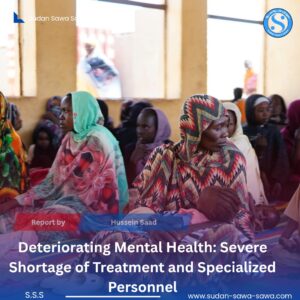
By: Hussein Saad
Sudan Sawa Sawa – July 6, 2025
Mental health in Sudan has been facing a worsening crisis since the outbreak of war in April 2023. The deteriorating security and political situation has led to widespread psychological suffering among the population. At the same time, the country is experiencing a severe shortage of specialized health personnel in this field.
According to reports from both international and local humanitarian organizations, millions of Sudanese are suffering from the psychological effects of forced displacement, loss of loved ones, destruction of homes, and the collapse of stability—all within an environment lacking basic services, including psychological and social support.
Doctors and specialists indicate that the most affected groups are children and women, as cases of depression, anxiety, and post-traumatic stress disorder (PTSD) have risen significantly amid the absence of primary mental healthcare services. It is estimated that there are currently only a few dozen psychiatrists working in Sudan, while millions of displaced people live in remote areas or overcrowded camps without any form of psychological support.
The crisis has deepened with the departure of many healthcare professionals from the country, either fleeing the war or due to the collapse of the healthcare system.
Professor Abdullah Shuwali, a psychology professor at Bahri University, stated:
“The situation is tragic. There are no resources, no medications, and not even a safe environment. We try to do what we can, but the numbers are far beyond our capacity.”
In an interview with Sudanese Reports, Shuwali explained that before the war, there were around 23 consultants and specialists in psychiatry, most of whom worked in Khartoum—equating to one psychiatrist per 100,000 people. He pointed to several hospitals that provide psychiatric care, such as Tijani Al-Mahi, Taha Ba’ashar, and Al-Idrisi, in addition to some state-level hospitals.
He noted that mental health treatment was only included in health insurance during the transitional government period, following pressure from the Association of Mental Health Professionals.
Shuwali attributed the exodus of mental health professionals to the government’s lack of interest in the sector, low salaries, and the absence of a supportive work environment. He emphasized that the war has exacerbated the number of mental health cases and stressed the urgent need to support mental healthcare, provide competitive salaries, and ensure up-to-date training.
He pointed out a critical shortage in mental health services, the absence of specialized centers, and the limited availability of data, which is currently the result of individual efforts. He explained that Sudan lacks laws requiring institutions to publish research related to mental health.
He also highlighted the challenges hindering the work of mental health personnel, such as poor funding, lack of security and safety, difficulty in mobility, and communication. He warned that neglecting this sector will have grave long-term consequences, especially for an entire generation of children and youth growing up in a climate of violence and destruction.
“Amidst Gunfire: Voices of Peace Take the Lead and Defy the Gun (1–2)”
Sudan Sawa Sawa – June 28, 2025
Report by: Hussein Saad
Amid the rubble of destroyed villages and cities, and homes abandoned by their residents due to the devastating war that has plagued Sudan since its outbreak on April 15, 2023 — between the Armed Forces and the Rapid Support Forces — despite the widespread destruction affecting both people and infrastructure, and the horrific deterioration of humanitarian conditions, voices have risen.
These are voices that carry no weapons but raise the banners of peace — women, youth, elders, children, and an exhausted yet resilient civil society — calling for peace, for an end to the war machine that has torn the country apart, and for the salvation of what remains of the homeland. These voices, born of pain and suffering, come in the form of grassroots initiatives, artistic calls, feminist efforts, youth-led and media campaigns — all striving to silence the sound of gunfire and amplify the voice of humanity.
These voices are not armed with rifles or laden with bombs — they are fueled by hope, sent from the depths of hearts, consciences, and voices. They are the voices of peace. Despite the destruction and difficulties, Sudanese men and women in civil society, as well as creative media professionals and artists, have returned to the forefront with powerful messages through songs, plays, and visual art that reject war and inspire hope.
Artistic groups have presented new works condemning the war and reviving the spirit of Sudanese solidarity. Visual artists have painted murals on the ruins of destroyed buildings. Some social media platforms have turned into podiums for peace, with users sharing content calling for the cessation of bloodshed, opposing hate speech and racism, documenting war crimes, and launching campaigns demanding an end to the war and aid for civilians. Others have written phrases like “The homeland belongs to all” and “No to war, yes to peace.”
The Pain of the People:
Despite the deep anguish engulfing the nation, sparks of hope still emerge in both individual and collective initiatives led by youth and women who believe the country deserves a second chance. In forgotten neighborhoods, villages, rural areas, displacement camps, and closed university campuses, small circles of dialogue are forming, awareness workshops are being held, and bridges of trust are being built between communities torn apart by war.
These efforts represent the first building blocks of a genuine peace — not one imposed from above, but one built from the ground up, from the pain and lost dignity of the people. Women, despite facing compounded physical and psychological violence, have insisted on being present in the scene of change — not as victims, but as leaders and initiators. They lead peace marches and establish centers for psychological and social support.
Meanwhile, youth have chosen to confront the culture of war with a culture of life. They’ve become active in shelters and emergency rooms, offering food and medical care, spreading messages of hope through social media, and resisting marginalization by creating alternative spaces for expression and participation.
The voices of peace are drawing the contours of a diverse Sudan — free of war and hatred. A Sudan whose fate is not decided by guns, but one built on justice, inclusion, and recognition of its diversity. This ancient nation — long a beacon of culture and resilience — does not deserve to be reduced to a map of conflicts, nor should it be left alone to face its wounds.
Let these voices — the voices of youth and women — be the final cry before silence engulfs everything. Let peace not remain a mere slogan, but a real path paved by the will of the people and written by sacrifices that have never ceased. In a homeland exhausted by wars and fire that has displaced thousands of lives, the voices of peace still rise from the ruins — faint, but sincere — calling for a homeland that embraces its people rather than tears them apart.
In Sudan, the cries of grieving mothers, the moans of displaced children, and the screams of young people robbed of their dreams and futures grow louder. Amidst this darkness, the participation of women, youth, and civil society shines like candles defying extinction — holding olive branches in one hand and a crucified homeland in their hearts. The war, which makes no distinction between young and old, has left no home untouched by pain. Yet it has also failed to silence the calls for peace, which have now become more urgent than ever.
Their voices are not merely hopeful — they are a national and moral necessity to save what remains of Sudan and end this prolonged cycle of bloodshed and suffering.
Memory of Pain:
Though today we write about war, tomorrow we hope to write about return, about reconciliation, about the birth of a homeland rising from the ashes like a phoenix — bearing in its eyes the memory of pain, yet moving steadily toward a future it deserves.
Sudan does not deserve this silence, nor does it suit this devastation. It is the land of poets who sang of love and freedom, the land of Kandakas (strong Sudanese women) who prayed for peace in every supplication, and the land of children who dreamed of schools, not military camps.
Today, the voice of peace in Sudan resembles a desperate cry — a plea from a soul worn down by suffering, knocking on the doors of the world with the tears of men and women, the patience of mothers, and the voices of youth who have not yet lost their ability to dream. In times of war, clinging to hope becomes an act of resistance; words become weapons against destruction, and dialogue becomes a narrow path — but the only one that can lead to life.
The youth — who have lost their opportunities for education and employment and who know the sound of gunfire more than the sound of school bells — do not ask for much. Only that the war ends. That they be given the chance to live, like all other people on Earth.
And the women — who found themselves guarding empty homes and nursing wounds that would not heal — have today become active participants in every arena of peaceful struggle. They establish initiatives, distribute food, and build bridges of trust in communities torn apart by racism, hatred, and displacement.
But peace does not come from a void. It requires political will, public pressure, and the genuine inclusion of those long marginalized — foremost among them youth and women. That is why these voices, rising today from the ruins, are not begging for charity. They are demanding their rights: the right to life, the right to safety, and the right to build Sudan with the hands of all its children, even on the ruins of their shattered dreams.
If these cries are not answered, Sudan will continue heading toward a darker future. But if they are heard, they may mark the beginning of a way out — the start of a new chapter titled: “A Peace Made by Its People.”
Peace Written in Love:
The women who lost their sons, the youth whose dreams were shattered on the frontlines, the artists who resisted with paintings and songs — they are not just victims. They are the guardians of memory and the builders of the peace to come. Their voices are the only remaining truth amid the lies of war, the only light at the end of this long tunnel.
Let this plea be the final word:
No to war. No to senseless death. No to the destruction of nations.
Yes to peace created by the people — not governments alone.
Yes to peace written in love, not in bullets.
Yes to a new Sudan, where the voice of poetry rises louder than the voice of guns.
What breaks the heart is that these calls for peace are sometimes met with neglect or repression — as if calling for an end to war were a crime, or as if demanding life were a form of rebellion. In a country oscillating between signing fragile peace agreements and the threat of total collapse, the basic demands of the people — for safety, food, and education — are treated as luxuries by those in power, while in reality, they are the most basic human rights.
The women who lost sons and husbands in the inferno of war did not find time to grieve. They were forced into roles far beyond their capacity — breadwinners, caregivers, comforters of frightened children. And yet, their will was never broken. Today, they are shaping a new language of peace — one understood by every mother who has lost, and every girl who watched war steal her childhood.
As for the youth, they are a generation born into crisis — who rarely, if ever, tasted stability. Yet they did not choose to withdraw. On the contrary, they are at the frontlines of every initiative demanding transitional justice, every call for change, and every dream of a country where authority is not held by force of arms, but protected by law and constitution. Although the road to peace is long and exhausting, these efforts — these souls clinging to hope — tell us something vital:
Sudan is not dead. There is still a heartbeat. There is still life.
And it can rise again — if we truly listen to the voices of the people, not the sounds of artillery. It is time to end the bleeding. To lay down arms.
Not merely through top-down decisions, but with a collective will rising from the depths of the streets, from mothers’ tears, and from the hands of young people raised endlessly in pursuit of freedom.
The future of Sudan cannot be built on ruins — it must be built on reconciliation, acknowledgment, and justice. We must listen more than we explain. We must humble ourselves more than we boast. Every moment of delay means more death. More division. More generations losing faith in the very idea of a homeland.
Is the world listening? Has conscience awakened?
Sudan is calling — in the voices of its mothers, youth, and women — is there anyone to answer?
“Preventive Efforts in Jebel Marra: Emergency Room Launches Environmental Cleanup Campaign in Preparation for the Rainy Season”
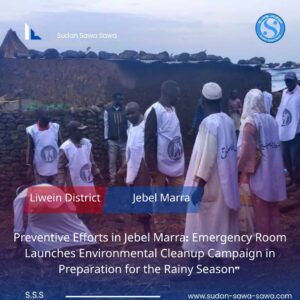
Sudan Sawa Sawa – June 26, 2025
As a proactive measure aimed at mitigating the impact of the rainy season and preventing potential environmental and health disasters, the Emergency Room – Liwein District, in coordination with the Tawila Emergency Room – Jebel Marra, has announced the launch of a large-scale environmental and street cleaning campaign starting in June 2025.
The campaign covers several key areas within the Jebel Marra region, including Keti, Brio, Joldo, and Liwein. And the Intensive field activities have been organized to clean neighborhoods, remove waste, clear drainage systems, and facilitate water runoff. Local communities have actively participated, highlighting the importance of environmental preservation and preventive measures against diseases associated with waste accumulation and stagnant water.
This initiative comes amid growing concerns about the worsening environmental situation at the start of the rainy season, especially in areas lacking the necessary infrastructure to handle floods or proper drainage.
Local Coordination and Community Support:
Speaking a member of the Emergency Room to Sudan Sawa Sawa, “that the Coordination with the Tawila Emergency Room has been essential to ensure the distribution and integration of efforts, while involving the local community in cleaning and health prevention activities.” He confirmed that the campaign would continue for several days to address as many pollution hotspots and potential risks as possible.
Calls for Support and Expanded Participation:
The organizing bodies have called on all local and international organizations, as well as community activists, to contribute to the campaign—whether through logistical supplies, technical support, or awareness initiatives—to ensure the effectiveness and sustainability of these interventions.
This campaign underscores that early preparation for the rainy season is no longer optional but an urgent necessity, given the effects of climate change and the increasing rainfall that threatens the lives of residents in many parts of Sudan. The Jebel Marra region, in particular, remains one of the most vulnerable due to its geographical and environmental characteristics.
“How Did the Lack of Healthcare Services in Darbat Lead to a Patient’s Death? A Tragedy Unfolds in Eastern Jebel Marra”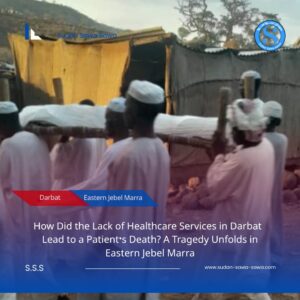
Sudan Sawa Sawa – June 25, 2025
In a heartbreaking incident that highlights the severe deterioration of healthcare services in the Jebel Marra region, 65-year-old Halima Abdel Jabbar Nasor Suleiman died in the area of Darbat in eastern Jebel Marra after her health condition rapidly declined.
According to Sudan Sawa Sawa’s correspondent, Mrs. Halima did not receive adequate medical care during the critical hours preceding her death. The Rural Darbat Women and Maternity Hospital suffers from a severe lack of medical resources, an acute shortage of medical and nursing staff, and an almost complete absence of essential medicines and basic supplies. This has left the facility incapable of providing even the most basic healthcare services, particularly to vulnerable groups such as the elderly and pregnant women.
In a related development, Sudan Sawa Sawa had previously reported similar cases, including the tragic death of a fetus in the womb of its mother due to the inability to provide necessary medical care. The pregnant woman, 25 years old, was transported to the Tawila Locality for surgery but later succumbed as well.
These incidents shed light on the grim healthcare reality in Darbat and the eastern Jebel Marra region, where humanitarian support is scarce, and the intervention of aid organizations is minimal despite worsening living conditions. The repeated tragedies raise serious questions about accountability for such deaths, especially in light of the apparent inaction to address the accelerating healthcare collapse.
Although the death of Mrs. Halima occurred quietly, it has become a humanitarian outcry, calling for urgent intervention to restore even the most basic level of medical services to the region—before Darbat turns into a devastated health disaster zone where lost lives are reduced to uncounted statistics.
“Displaced People Under the Rain: Heavy Rains Destroy Fragile Shelter in Hamidiya Camp in Zalingei”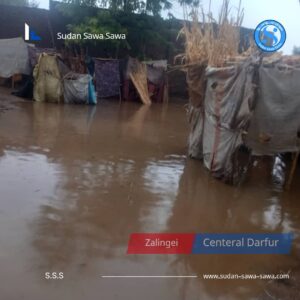
Sudan Sawa Sawa – June 20, 2025
The camera of “Sudan Sawa Sawa” captured live scenes of heavy rainfall that lasted for over four hours on Thursday, June 19, 2025. This caused direct damage to several shelters within the Hamidiya camp in Zalingei, Central Darfur, particularly affecting the displacement centers “Dar Al-Salam” and “Al-Amal.”
According to a reporter from Sudan Sawa Sawa, the floods resulting from the rain caused water to seep into tents and temporary mud dwellings, leading to the destruction of displaced people’s belongings. The living conditions for the displaced, especially for children, women, and the elderly, are deteriorating, as they face increasingly difficult humanitarian circumstances.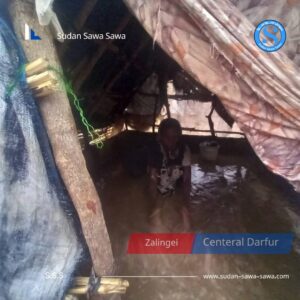
Zalingei is one of the areas most affected by seasonal rains in the Darfur region, compounded by a lack of adequate infrastructure and proper drainage systems within the camps. This incident highlights the urgent need for humanitarian interventions to improve shelter conditions and enhance protective measures as the peak of the rainy season approaches.
In a related context, activists from civil society organizations have called on local authorities and humanitarian organizations to take immediate action to provide necessary assistance and mitigate the impacts of recurring natural disasters that threaten the lives of thousands of displaced people.
“Displaced People in Golo Face Rain Without Safe Shelter: Under Thatch and Cloth”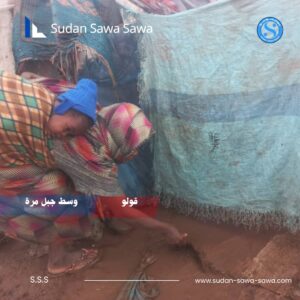
Sudan Sawa Sawa, June 19, 2025
A correspondent for Sudan Sawa Sawa reported that displaced individuals fleeing from the conflict to the Golo area in the Jebel Marra region are facing dire humanitarian conditions as the rainy season begins. They are living in makeshift shelters, and heavy rains on the 17th and 18th of June have damaged their belongings that increased health risks amid a severe shortage of tarps and a lack of urgent humanitarian support.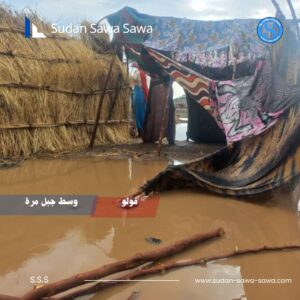
These affected families are urgently appealing to humanitarian organizations for assistance in providing shelter and protective supplies. This suffering is an extension of the ongoing displacement crisis in Darfur due to conflicts and deteriorating security conditions, which is putting additional pressure on inadequately equipped shelters.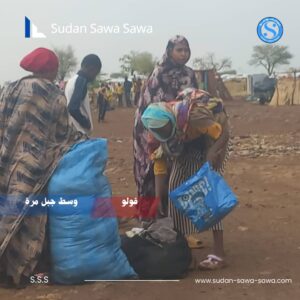
“Escalating Attacks: Young Girl Killed During Outing…. Security Absent”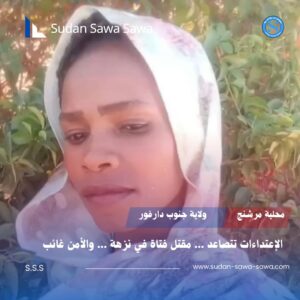
Sudan Sawa Sawa, June 15, 2025
A tragic murder occurred on June 14, 2025, resulting in the death of the young girl Tahani Mohamed Khalid while she was on an outing in the Mershang locality of South Darfur, accompanied by a group of girls. The group was attacked by armed members of the Rapid Support Forces.
And according to local sources and eyewitnesses who spoke to Sudan Sawa Sawa, these armed individuals stopped the girls in the valley of Mershang locality, and one of them directly threatened the victim, demanding to hand over mobile phone. Initial information indicates that Ms. Khalid, the victim, attempted to resist or escape, prompting one of the assailants to use excessive violence against her, leading to her immediate death.
Witness statements revealed that the perpetrators fled the scene before any security support arrived, while her friends remained in a state of shock and extreme fear.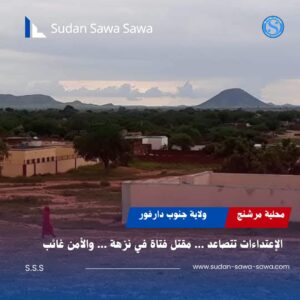
The crime has sparked widespread outrage among the local population, who expressed increasing concern over the repetition of such incidents. Additionally, the Mershang locality is controlled by the Rapid Support Forces, which lack a regular security presence. Activists and local stakeholders have called for urgent measures to enhance community protection, especially for girls and women.
It is notable that this incident occurs amid a noticeable rise in assaults and organized crimes in the Mershang locality.
“Launch of Community Initiative for Cleaning the Dira-Darbat Road East of Jebel Marra in the Karo Federation”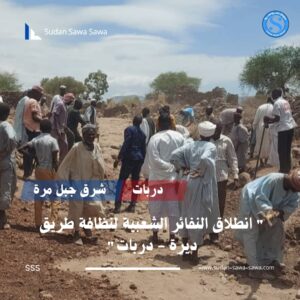
Sudan Sawa Sawa, June 13, 2025
East Jebel Marra – Darbat
In light of the increasing environmental challenges that accompany the onset of the rainy season, the Karo Federation, in collaboration with local communities, has launched a broad community campaign to clean and level the road connecting the Dira and Darbat areas, east of Jebel Marra.
This grassroots initiative comes at a critical time, as the region prepares for the rainy season, which brings heavy rains that can significantly affect dirt road networks and hinder the movement of citizens in the Jebel Marra areas.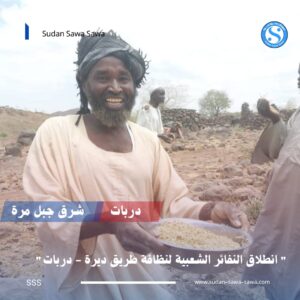
Community Awareness and Early Preparation:
Residents flocked to the worksite ahead of the rainy season to level the dirt and clean the grass and potholes along the road. Participants expressed their full awareness of the dangers of neglecting road maintenance during this sensitive time of year.
Local residents told Sudan Sawa Sawa, “We know that the upcoming rains could completely block the road if we don’t prepare for them now. That’s why this initiative was launched by the Karo Federation.”
The Road: A Threatened Lifeline:
The Dira-Darbat road is a vital artery for transporting patients, students, and agricultural products, especially with the start of the farming season. Typically, heavy rains lead to flooding of side ditches and soil erosion, turning some sections into muddy swamps.
Documentation and Community Motivation:
Sudan Sawa Sawa accompanied the campaign with its camera, documenting the stages of work and testimonials from participants, highlighting the efforts of local communities in managing their own affairs.
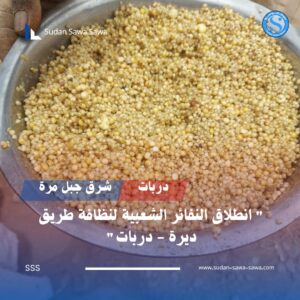 A Model for Rural Communities:
A Model for Rural Communities:
This initiative serves as a model for rural areas in Sudan, where people overcome climatic and political challenges through solidarity and collective action. The federation has called on neighboring communities to emulate this experience.
“We Don’t Feel Safe… The Conflict Has Taken Everything from Us.”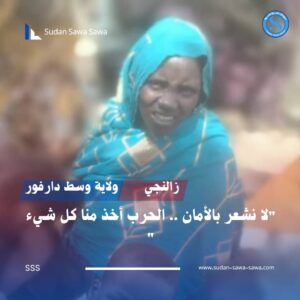
Sudan Sawa Sawa, June 10, 2025
Amid ongoing armed conflict and worsening humanitarian conditions in Darfur, the tragedy of 37-year-old displaced woman Awadia highlights the harsh reality faced by thousands fleeing the ravages of conflict.
Awadia, who was displaced from the “Hassa Hessa” camp to “Five Minutes camp,” has temporarily settled in the “Hejar” dormitory in Zalingei, which has turned into an overcrowded shelter lacking even the most basic necessities for a dignified life. She shares her story with a reporter from “Sudan Sawa Sawa,” expressing that the feeling of safety is nonexistent, as armed strangers enter the shelters at night, raising concerns and increasing tension among women and children.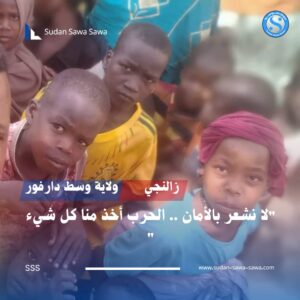
The health situation within the center is equally dire, with a complete absence of medical services. Displaced families rely on traditional home remedies due to the lack of humanitarian organizations. Awadia notes that the only emergency room that provided some support has suspended its activities for over eight months, exacerbating residents’ suffering.
In terms of livelihood, most displaced individuals depend on simple daily labor to secure food. Children aged 7 to 10 work in marginal jobs, while adults head to farms to earn a living, all amid harsh and unstable conditions.
Awadia emphasizes that the conflict has not only stripped them of their homes and belongings but has also deprived them of safety, health, and food, leaving deep psychological scars. She concludes her remarks with a poignant plea:
“We urge for an end to the conflict… We just want peace and to return to a dignified life that preserves what little dignity we have left.”
“Makeshift Homes of Straw and Fabric: Displaced People in Tawila Area Face Autumn Challenges in the Open”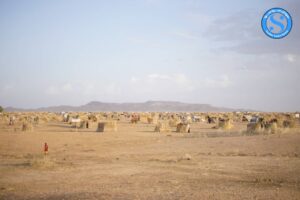
Tawila: Sudan Sawa Sawa, June 8, 2025
Displaced individuals in the Tawila area are living under extremely difficult humanitarian conditions, with many residing in makeshift shelters made of straw, fabric, and tree branches. Some are forced to sleep outdoors without any protection.
A field survey conducted by a correspondent from Sudan Sawa Sawa revealed that the impending autumn season has heightened the fears of these displaced individuals who lack the most basic necessities for a dignified life. Their lives are at real risk due to the absence of protection.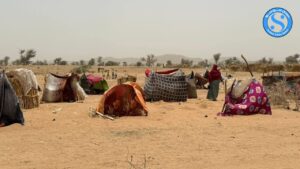
Therefore, through the platform of Sudan Sawa Sawa, these displaced individuals are urgently appealing to humanitarian organizations working in the fields of shelter and settlement for immediate intervention. They seek assistance to save their lives by providing tarps and essential supplies to secure a shelter that preserves their dignity and protects them from the rain.
“Mukjar: 70 to 90 Cases of Diarrhea and Infections Daily in Mukjar”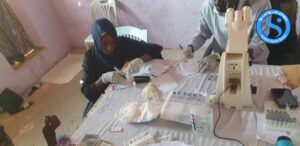
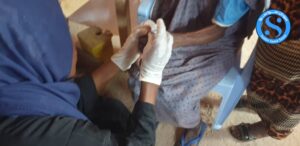
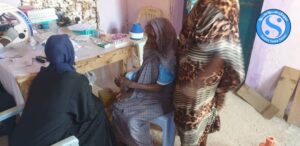
Sudan Sawa Sawa, June 4, 2025
A member of the emergency room in Mukjar, who preferred to remain anonymous for security reasons, revealed to Sudan Sawa Sawa that the health situation in the locality has deteriorated significantly since the beginning of this week, with daily increases in reported cases.
The medical team at the Mukjar locality hospital in Central Darfur informed Sudan Sawa Sawa that the number of cases recorded daily ranges between 70 and 90. This surge is putting immense pressure on health facilities, which are suffering from a severe shortage of medical supplies and medications, as well as essential testing equipment.
Currently, the available devices are traditional and limited to malaria testing, which is insufficient for diagnosing widespread cases. Residents in the area have expressed their growing concern about the rising number of infections, reiterating their urgent appeal to humanitarian organizations for immediate intervention to contain this crisis.
“Prices of Consumer Goods in Derbat Market – East Jebel Marra”
Sudan Sawa Sawa Team – Derbat, East Jebel Marra, June 3th, 2025.
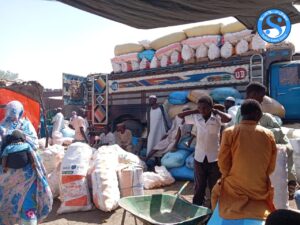
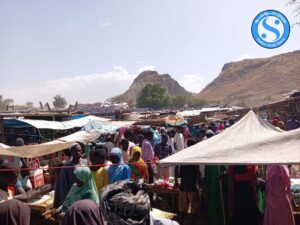
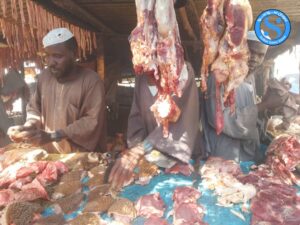
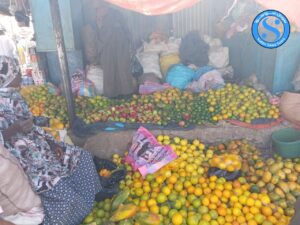
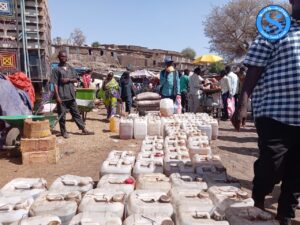
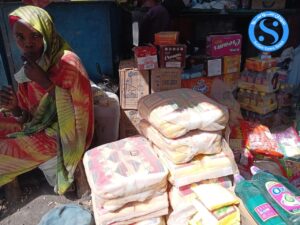
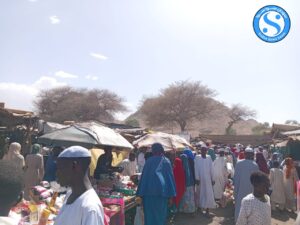
“Deterioration of Health and Humanitarian Situation in Mukjar Locality, Central Darfur”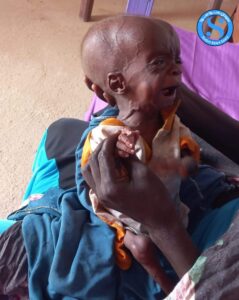
Sudan Sawa Sawa, June 2, 2025
The Mukjar Emergency Room has issued an urgent humanitarian appeal, calling for immediate intervention from international and regional organizations concerned with humanitarian and health issues. This plea comes in response to the significant deterioration in the health and humanitarian sectors within the locality, exacerbated by the ongoing armed conflict in the region.
Health Situation:
– There has been a sharp decline in emergency and ambulance services at health centers and clinics, with an almost complete absence of rapid response capabilities.
– There is a severe shortage of essential medications, intravenous fluids, and necessary medical supplies.
– A noticeable lack of medical personnel due to displacement and security conditions, along with the absence of logistical support for health facilities.
– The outbreak of serious diseases such as measles, acute watery diarrhea, and severe malnutrition, particularly among children.
– Deterioration of reproductive health services and a lack of safe delivery conditions, threatening the lives of pregnant women.
– A complete absence of preventive services as the rainy season approaches, raising concerns about the spread of epidemics like malaria.
– Weak or entirely halted food distribution and humanitarian aid operations, further increasing the suffering of local residents.
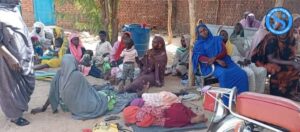
Urgent Appeal:
The Emergency Room calls for:
1. Immediate intervention from international and regional organizations working in the humanitarian and health sectors to provide urgent support.
2. Supply of health centers with medical supplies, medications, and essential fluids to save lives.
3. Implementation of urgent campaigns for nutrition, public health, and epidemic prevention, especially in light of the threat of malaria and diseases related to malnutrition.
“Prices of Consumer Goods in AL Faw AL Gadarif State – Sudan”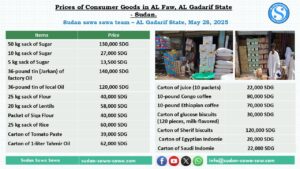
Sudan Sawa Sawa Team – AL Gadarif State, May 28, 2025.
“Prices of Consumer Goods in Rokro, Jebel Marra – Western side of Sudan”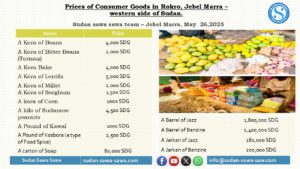
Sudan Sawa Sawa Team – Jebel Marra, May 26, 2025
“Prices of Consumer Goods in Rokro, Jebel Marra – Western side of Sudan”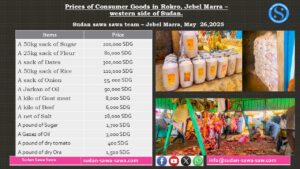
Sudan Sawa Sawa Team – Jebel Marra, May 26, 2025
“Prices of Consumer Goods in Omdurman – Sudan”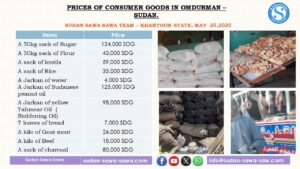
Sudan Sawa Sawa Team – Khartoum state, May 25, 2025
“Between the Woes of War and Harsh Humanitarian Conditions: East Nile Camp for IDPs in Wadi Azoom Locality – Central Darfur”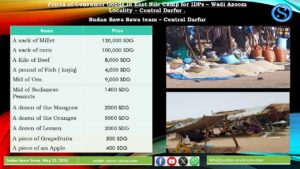
Sudan Sawa Sawa, May 23, 2025
The East Nile Camp is located northwest of Zalingei, approximately 50 kilometers away, and southwest of Geneina. To the northwest lies the town of Mornei, about 5 kilometers from the camp, while the Ronqatass camp is situated 2 kilometers to the south. To the east and north, the camp is bordered by Kreinik locality. The camp’s residents are displaced individuals who fled from the states of West and Central Darfur, with their initial displacement beginning when the war erupted in 2003. Following the renewed conflict on April 15, 2023, families from various states of Sudan arrived at the camp.
Displaced persons in the East Nile Camp live under severe conditions, lacking stable sources of income and relying heavily on humanitarian aid from organizations and donors. No more than 10% of the population engages in agriculture. The areas surrounding the camp are controlled by Rapid Support Forces. Camp residents reported to “Sudan Sawa Sawa” that they are experiencing acute shortages of food, medicine, and shelter due to the interruption of supplies from organizations for over six months. They are urgently calling on human rights and humanitarian organizations to intervene and save them from these tragic circumstances.
“Prices of consumer goods in the market of Tawila Locality – North Darfur”
Tawila: Sudan Sawa Sawa Team, May 21, 2025
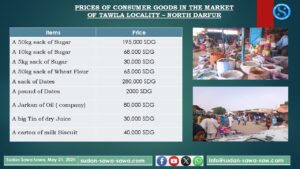
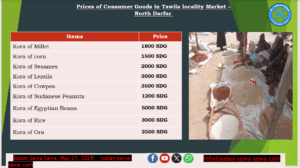
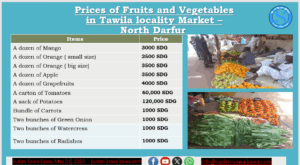
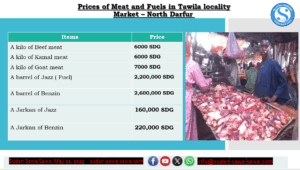
“Trader Killed in Saraf Omra – North Darfur”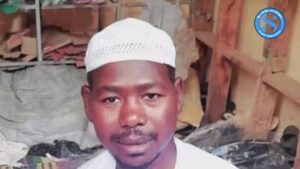
Sudan Sawa Sawa, May 18, 2025
Sources have informed “Sudan Sawa Sawa” that the Saraf Omra locality in North Darfur is experiencing serious security disturbances. On the evening of Monday, May 12, 2025, a citizen named Haroun Yahya Boron, who was returning home from the market in the Al-Salam neighborhood, was attacked by armed assailants who threatened him with the intent to rob. They shot him, resulting in his death. Haroun was a shoe trader in the Saraf Omra market.
Golo – Central Jebel Marra: Sudan Sawa Sawa Team, May 17, 2025.
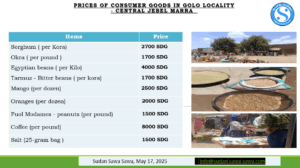
“Challenges in Healthcare Infrastructure in Zalingei – Central Darfur”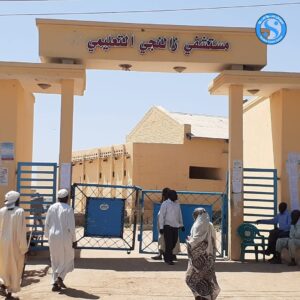
Sudan Sawa Sawa – May 17, 2025
Zalingei Teaching Hospital receives approximately 20 cases of chronic infections daily, according to local sources reported to “Sudan Sawa Sawa.” The sources also confirmed that the hospital continues to provide its services despite the difficulties facing since the conflict broke out, which has now entered its third year. The hospital management oversees operations with supportfrom Médecins Sans Frontières (MSF) and the Rapid Support Forces (RSF).
The hospital includes a variety of departments, such as “Diabetes,” “Pediatrics,” “Obstetrics,” “Nutrition,” and “Surgery,” in addition to some basic health services that are lacking in private health centers.
There has been a noticeable increase in cases of infections and diarrhea among children, along with severe fevers caused by climate change and malnutrition, making access to treatments difficult and significantly raising their prices. The cost of infection-related treatments has reached 20,000Sudanese pounds, reflecting a 15% increase, which has forced vulnerable groups to rely on local remedies or forgo some of their daily needs to meet basic necessities.
Niertiti: Sudan Sawa Sawa team, May 16, 2025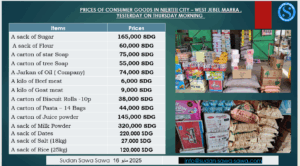
Zalingei : Sudan Sawa Sawa Team 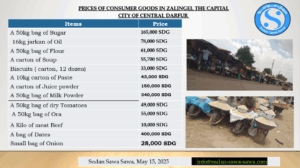
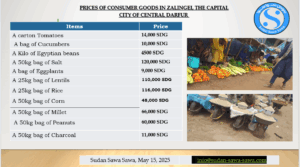
“Conditions of Women in Hamidiya Camp Zalingei, Central Darfur During the War”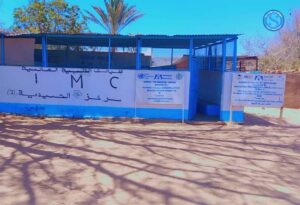
Zalingei: Sudan Sawa Sawa, May 2, 2025
The war has had devastating effects on women, who suffer mercilessly as they struggle to survive. Women make up about 40% of the region’s population and engage in various forms of work, such as collecting firewood, laundry, traditional farming, and brick-making.
Violations Against Women in the Region:
Violations against women began with the onset of displacement in 2003 and kept continuing to this day. Before the outbreak of war on April 15, 2023, violations occurred outside the camps, but now they extend even within the camps, where girls aged 15 to 30 face the most heinous forms of assault without having done anything to deserve it.
Before the departure of the IMC organization, support was provided to victims at its health centers. However, after their exit, there is no longer anyone to help them. Consequently, they are appealing to those with conscience and human rights organizations to intervene and resolve the crises faced by women in the camps.
A correspondent from “Sawa Sawa” interviewed a displaced woman, who requested anonymity. She is 45 years old, married, and has been living in the camp since the beginning of the displacement in 2003. She relies solely on informal jobs such as collecting firewood, working as a domestic servant for the wealthy, traditional farming, and brick-making.
She confirmed that women face numerous challenges, such as early and forced marriages for girls, domestic violence, limited economic and educational opportunities, as well as a lack of rights, care, and health services. She has no idea how long these challenges will persist, and there are no alternatives to these harsh jobs and living conditions.
When a violation against women occurs, everyone feels anger and concern for their safety. Psychological support is offered to the affected individuals, with careful listening and some medical assistance, as she describes the situation as catastrophic.
Physical Health:
Maintaining heart health through proper nutrition, breast health through regular check-ups, and reproductive health through personal hygiene has become extremely difficult due to the closure of health centers and the challenges of movement resulting from the lack of security.
Mental Health:
To preserve mental health during pregnancy, it is essential to have regular check-ups and manage stress and anxiety through exercise. However, the women in this region lack the necessary care, putting their health and lives at greater risk.
Healthy Nutrition:
The region lacks healthy and balanced food, as there are no organizations working to support nutrition. As the war continues, food disasters have increased, resembling famine conditions.
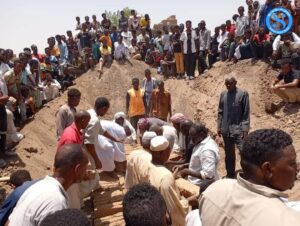
More than ten people were killed, and 22 others were injured during the Rapid Support Forces’ drones in Atbara, River Nile State. The city of Atbara witnessed heartbreaking scenes during the funeral of the martyrs from the shelter camp, who lost their lives on the morning of April 25, 2025, at the railway shelter center. According to sources to “Sudan Sawa Sawa,” the camps of the Al-Barah battalions are located near the displaced persons shelter.
In an interview with “Sudan Sawa Sawa,” Al-Samani mentioned that his family, which fled from Bahri Al-Waburat to Atbara to escape the ravages of war, consists of:
– His wife, Zohour Omar, and their four children:
– Yathreb Al-Samani
– Maria Al-Samani
– Ma’ab Al-Samani
– Eilaf Al-Samani
– In addition to his nephew, Ahmed Abdullah.
“Death of Rapid Support Forces Commander Ahmed Barakah Allah in Nyala”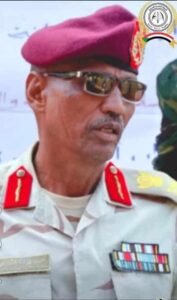
South Darfur: Sudan Sawa Sawa, April 14, 2025
On April 12, the popular market in the city of Nyala witnessed a state of security unrest, as reported by a correspondent from Sudan Sawa Sawa. These tensions arose from statements issued by the Rapid Support Forces police a week earlier regarding weapons collection and wanted individuals, which were carried out in a neighborhood of the city.
According to local sources for Sudan Sawa Sawa, amidst these events, a soldier from the Rapid Support Forces, belonging to the Beni Halba tribe, expressed his frustration over the confiscation of his weapon and demanded its return. The tribe’s elders requested the presence of his commander and relevant authorities, but the soldier erupted in anger and resorted to violence. According to statements from the Rapid Support Forces commander, a shot was fired at the first victim, Ahmed Abassiya, who was taken to the hospital for treatment.
Shortly thereafter, his death was announced, leading members of the Beni Halba tribe to gather and target the police station in Nyala South, where violent clashes erupted between the two sides that lasted for an hour and a half, resulting in dozens of casualties among both civilians and military personnel.
Rapid Support Forces Commander Ahmed Barakah Allah arrived, waving a white flag in an attempt to mediate between the parties. However, while trying to convey his message, he was shot in the chest, leading to his swift death. Markets remain closed, and the security situation remains unstable.
“General Coordination of Displaced Persons and Refugees Camps – Sudan”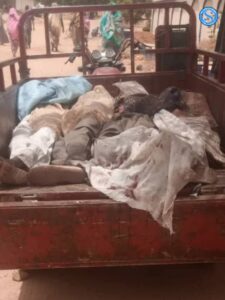
Sudan Sawa Sawa April 12, 2025
On April 10 and 11, the Abu Shouk camp was subjected to heavy artillery shelling, resulting in the deaths of 35 displaced persons, mostly women and children, in addition to dozens of injuries and the destruction of homes and infrastructure. The tragedy did not stop there; it continued on April 11 and 12 with a horrific attack on the Zamzam camp, leaving hundreds dead and injured, the majority of whom were women and children.
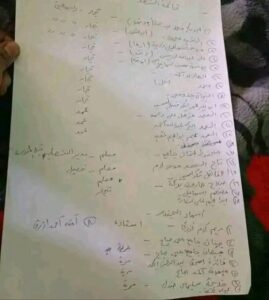
Nyala: “Economic Challenges and Unceasing Storms of War”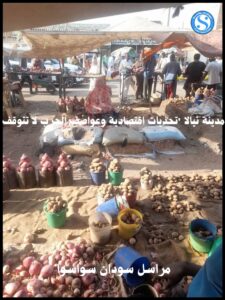
Nyala: Sudan Sawa Sawa, March 17, 2025
The city of Nyala, the capital of South Darfur State, is grappling with a severe crisis in vegetable prices as the economic situation worsens and residents suffer from the repercussions of war that have devastated the essentials of life in the city.
Vegetable prices have skyrocketed to unprecedented levels, as reported by a correspondent from Sudan Sawa Sawa during a tour of Nyala’s markets. The prices are as follows:
– A sack of potatoes has risen from 80,000 to 140,000
– A sack of okra has increased from 30,000 to 60,000
– A sack of green beans has jumped from 25,000 to 95,000
– A sack of tomatoes has gone up from 15,000 to 40,000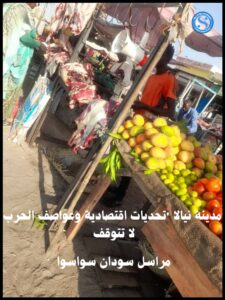
Conversely, the prices of sacks of onions, sugar, corn, and other food items have decreased significantly, leading to a decline in commercial activity in the city, despite markets being fully open. Citizens are struggling with the greed of traders who prefer to export vegetables to neighboring cities, causing persistent price instability and a continuous shortage of goods.
It has also been noted that the decline in commercial activity is partly due to the non-payment of salaries to most workers in the city since the onset of the war, along with the disruption of water, electricity, and communication services, which has exacerbated the suffering of Nyala’s residents.
“Zalingei Under the Weight of Wars and Displacement: Until When?”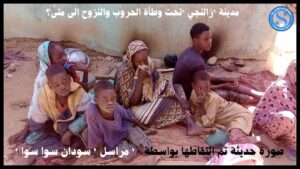
Zalingei: Sudan Sawa Sawa, March 14, 2025
A correspondent from Sudan Sawa Sawa reports that the residents of Darfur have been suffering since the outbreak of conflict on April 15, 2024. Many have lost their lives and have had their human rights violated. In Zalingei, citizens face harsh conditions due to the lack of basic humanitarian services needed for survival, especially for those displaced in the camps. These camps have seen a significant increase in population as most of the city’s residents seek safety.
The suffering has worsened with the cessation of humanitarian activities by organizations operating in Zalingei. In terms of food, residents are facing a severe shortage of food aid, as most do not receive assistance to meet their needs. For instance, a family of ten struggles to obtain food rations that amount to just two or three individuals per month, despite soaring prices for basic food items, such as sugar costing 150,000 Sudanese pounds, bread at 5,000, and beef at 8,000. This assistance is insufficient to satisfy the hunger of the citizens, leading to the deaths of thousands of children due to malnutrition, in addition to pregnant and nursing women.
A resident of Zalingei, who requested anonymity, spoke about the health situation, noting that health centers are suffering from a severe shortage of medicines and rising prices, as well as inadequate laboratory equipment. Conditions have deteriorated further with the halt of health support activities, which represented the only hope in the displacement camps. Health is the foundation of life, yet dozens, especially children, women, and the elderly, are dying due to a lack of treatment. Additionally, non-functional water stations leave citizens struggling to access clean drinking water.
Regarding education, the educational process is completely halted, leading to the loss of the future for youth and children. Many children enter the labor market at inappropriate ages, while young people suffer from unemployment and a lack of opportunities.
In terms of security, each day witnesses the death of individuals searching for food, with women facing assaults. The lives of Zalingei residents heavily depend on mothers, who are subjected to looting and violence, with some being killed on their way.
“Security Breakdown and Forced Migration of Nyala Residents”
South Darfur: Sudan Sawa Sawa, March 10, 2025
A correspondent for Sudan Sawa Sawa reported that the city of Nyala, the capital of South Darfur state, has experienced continuous tragic incidents since the outbreak of war on April 15. Citizens have suffered from theft and killings, with many losing their lives at the hands of armed assailants in the city’s markets and outskirts.
One resident told Sudan Sawa Sawa: “The security situation in this city deteriorates day by day, with unprecedented levels of chaos, causing citizens to live in fear and anxiety.” He added that all of the city’s markets are witnessing frequent thefts and robberies, particularly in the popular market, the Geneina station, and the Kadira market. Residents are unable to carry large quantities of goods or secure them in their shops, and the more money they carry, the greater the threat of robbery, whether from individuals posing as soldiers or riding motorcycles.
Another young man, who requested anonymity, stated: “The Rapid Support Forces have controlled the city for over a year, yet they make no effort to stop these negative phenomena.” He pointed out that the security breakdown has become normal in the city, with weapons circulating among people unrelated to the conflicts, in addition to the mobilization of underage youths.
Last Saturday evening, four citizens were killed in the Kadira market, sparking significant unrest between the Messiriya and Salamat tribes. A state of emergency was declared in the market, with traders and vendors being forcibly prevented from operating and subjected to flogging.
The persistence of these horrifying incidents poses a real threat to the citizens of Nyala, with the population in the city having reduced to only 30%. This has forced many to migrate forcibly to areas such as “Tawila” and “Jebel Marra” in search of safety.
“Humanitarian Efforts to Support 300 Displaced Families in the “Libah” Area East of Jebel Marra”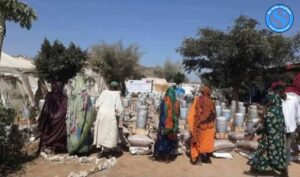
Jebel Marra: Sudan Sawa Sawa, March 9, 2025
As part of the ongoing efforts by humanitarian organizations in collaboration with local authorities in the “Libah” area of the Amu district east of Jebel Marra, a program was carried out to distribute food aid targeting 300 displaced and vulnerable families. This initiative was conducted by Mercy Corps (MC). The humanitarian assistance included the following items:
– 50 kg of sugar
– One jerrycan of oil
– One sack of rice
– One sack of flour
– One carton of soap
Local sources reported that the difficulty in delivering humanitarian aid has negatively impacted the performance of organizations and donors, which has adversely affected the lives of displaced individuals in camps throughout most areas of Darfur.
In recent months, the displaced have been suffering from harsh conditions due to a lack of available assistance and the challenges of daily life, especially with the approach of Ramadan and the associated needs for breaking the fast. This makes humanitarian aid essential to ensure their survival.
“Emergency Room – Water Crisis in the “Frok” Area of North Darfur”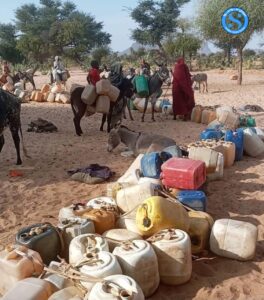
Kutum: Sudan Sawa Sawa, March 7, 2025
The “Frok” area in Kutum, North Darfur, is currently facing a severe water crisis that threatens the daily lives of its residents, who rely on this vital resource for their livelihoods. The roots of this crisis can be traced to several factors, including the deterioration of pumps and the lack of necessary spare parts, which have exacerbated the situation and threatened water and economic security.
Surveys from the emergency response team have identified the following key reasons for the crisis:
1. Pump Malfunctions: Most water pumps in the area are experiencing breakdowns due to prolonged use without regular maintenance, compounded by environmental factors such as soil conditions and untreated water.
2. Shortage of Spare Parts: The lack of necessary spare parts for repairing the pumps is one of the main challenges. The unavailability of suitable alternatives has led to the shutdown of many pumps, further complicating the situation.
3. Climate Change and Drought: Reduced rainfall and declining groundwater levels have increased pressure on the available pumps, making them prone to frequent malfunctions.
Additionally, residents of the “Frok” area are facing significant difficulties in obtaining clean drinking water, forcing them to travel long distances or purchase water at high prices. Water scarcity has led to deteriorating public hygiene and the spread of diseases associated with contaminated water.
The water crisis in the Frok area requires urgent and comprehensive intervention from relevant authorities to ensure the sustainability of water resources and improve the living conditions of the residents.
#SudanSawaSawa
#SawaSawa
“Thousands of Displaced Persons in Rokro Area Living in Tragic Humanitarian Conditions”
Report
Jebel Marra: Sudan Sawa Sawa, February 7, 2025
The Rokro area is one of the administrative units located north of Jebel Marra and has suffered for decades from the effects of armed conflict. Currently, it has become a refuge for thousands of displaced persons who have fled here to escape the ongoing conflict that has persisted for nearly twenty months.
Displaced individuals are living in shelters in Rokro under tragic conditions, facing significant challenges in securing their basic needs. They lack the most essential elements of daily life, including food, water, shelter materials, healthcare, and education.
Thousands of displaced individuals from various regions of Darfur, particularly from the city of El Fasher, have sought refuge here due to recurring events. If the situation continues as it is, we will face the risk of a severe famine. Therefore, there is an urgent need for United Nations agencies and international and regional organizations to enter the area to alleviate the suffering of the displaced and the local population. It is worth noting that this area is under the control of the Sudan Liberation Movement/Army led by Abdul Wahid Nour.
“General Coordination of Displaced Persons Statement on Bombardment of Cities, Camps, and Villages in Darfur”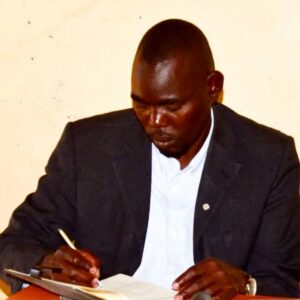
Sudan Sawa Sawa Now, February 6, 2025
For the sixth consecutive day, the Sudanese army has continued its airstrikes on neighborhoods in Nyala city, targeting areas densely populated with unarmed civilians. This bombardment has resulted in horrific massacres, claiming the lives of over 32 individuals and leaving dozens injured. It has also led to the destruction of infrastructure and the property of citizens. Despite the known and specific locations of the enemy, the attacks have been directly aimed at civilians who are guilty only of living in the city and lacking the ability to flee to safer areas.
This bombardment aims to systematically destroy civilian lives in a retaliatory manner, targeting specific social groups in an attempt to erase them from existence. This extreme approach reflects the brutality of the conflict parties. In the past, such crimes were committed in secrecy, but today, they are executed openly without any deterrent.
The General Coordination of Displaced Persons and Refugees strongly condemns these horrific massacres, acts of genocide, ethnic cleansing, and ongoing crimes against humanity and war crimes. The actions perpetrated by both parties to the conflict—the Sudanese army through airstrikes and extrajudicial executions, and the Rapid Support Forces through artillery shelling and continuous attacks—confirm that this devastating war has created a tragic reality and introduced new terms into the Sudanese landscape, which will negatively impact community cohesion in the future.
We reiterate our appeal to all parties involved in the conflict to immediately cease hostilities and end the suffering of the citizens, prioritizing the interests of the nation and the community over narrow interests. We also call on the international community to take a firm and effective stance against these horrific crimes, exerting maximum pressure to stop the war and protect civilians, especially women and children who have been deprived of their most basic rights, such as healthcare and education. This was stated by Adam Rijal, the official spokesperson for the General Coordination of Displaced Persons and Refugees.
“Humanitarian Challenges: Emergency Room of the Southern Al hizam”
Khartoum: Sudan Sawa Sawa Network, January 6, 2025
The Emergency Room of the Southern Al hizam, located south of Khartoum, reported that the humanitarian situation in the Southern Al hizam has reached a critical juncture, deteriorating significantly due to the ongoing conflict between the warring parties in Sudan. This situation has had a direct impact on the livelihoods of citizens in the conflict zones.
The only glimmer of hope in the darkness of these forgotten areas came in December of last year when the region received its first shipment of humanitarian aid to enter the capital, Khartoum, supported by the World Food Programme (WFP) in coordination with the Emergency Room of Khartoum State and implemented by local emergency committees in their customary structure in the Jebel Awliya area and the Southern Al hizam Emergency Room across its various sectors.
The primary objective of this humanitarian aid was to assist those affected and provide food and supplies to the victims of the war in the areas controlled by the RSF. This aid significantly alleviated the suffering of the citizens in the Southern Al hizam, who had hoped for a continuation of this support on a monthly basis. However, their hopes were dashed after more than a month passed since the last shipment arrived without any follow-up assistance.
The Southern Al hizam area is currently suffering from severe shortages of food and supplies, exacerbated by the recent developments in the conflict between the warring parties near the capital, especially around Bahri and the Headquarter of the Army in central Khartoum. Most traders have become anxious and withdrawn much of their goods from the main and secondary markets serving the Southern Al hizam area, including the Central Market of Khartoum, Goro Market, Old and New Market 6, Lagalag Market, Al-Sahreeg Market, Grocery Market, and Abuja Market.
The complete closure of supply routes by the army for food materials from the northern regions, the Nile River area, and Eastern Sudan to the capital, Khartoum—specifically in RSF-controlled areas—has further complicated the situation.
This complex scenario has resulted in a severe shortage of essential food items that residents of the Southern Al hizam rely on for their daily sustenance, including flour, sugar, rice, lentils, and pasta While there are some legumes available from the Al Jazeera and Sennar regions, such as lentils and fava beans, the items listed above are primarily stored by traders who have exploited the current conditions by dramatically raising prices, making these goods unaffordable for low-income citizens.
In a similar vein, the issue of bread scarcity has rapidly escalated, as most bakeries have shut down due to the unavailability of baking flour (specifically, “baker’s flour”) The flour that remains in traders’ stores is now priced beyond reach.
Regarding the communal kitchens in the South Belt, they are divided into two sectors: the Nasr Sector and the Al-Azhari Sector. Kitchens in the Nasr Sector are operating regularly, supported by the World Food Programme (WFP), while those in the Al-Azhari Sector have been completely inactive for nearly a month due to the cessation of donor support and the lack of available alternatives to cover the shortfall.
As for the healthcare situation in the Southern Al hizam, it is alarmingly deteriorating. The only hospital serving the area, Bashair Hospital, is functioning only partially due to a strike declared by medical staff in response to an incident involving gunfire in the emergency department by a member of the RSF. This hospital previously provided free medical services to citizens, but doctors and volunteers have faced a series of assaults and ongoing pressures. Currently, the hospital’s operations are limited to the dialysis unit and nutritional support for children, pregnant women, and nursing mothers.
It is worth noting that after Médecins Sans Frontières (Doctors Without Borders) withdrew from the hospital, the situation has become dire due to the departure of the majority of medical staff and a decrease in the stock of medications. The hospital has faced successive crises; at the beginning of this week, the only ambulance serving the hospital was stolen. The following day, the backup generator was also taken, along with some supplies from the Emergency Room of the Southern Al hizam, which is based in one of the hospital’s buildings. All these incidents are a result of the prevailing security instability in the area.
In terms of services, conditions are at their worst. Electricity has been unavailable in the region for nearly a year. Water has also become scarce, forcing citizens to endure hardships to obtain it, often paying 10,000 Sudanese pounds for a barrel of water.
Additionally, communication and internet networks have been down for over a year. Citizens are now primarily reliant on Starlink services for communication, incurring high costs from their daily earnings to maintain connectivity. Moreover, many Starlink networks have ceased functioning due to recent developments, contributing to the scarcity affecting the region in all aspects.
“Reports”
Sudan: Sudan Sawa Sawa, January 31, 2025
The Sudanese Minister of Finance, Jibril Ibrahim, has instructed commercial banks not to reduce the amount of money withdrawals or allow any party to engage in cash trading, in order to avoid usurious transactions related to cash.
Additionally, the political mechanism of the “Taqaddum” coordination agreed during its official meeting to sever ties with entities and individuals insisting on forming a government in exile. “Taqaddum” reiterated its rejection of establishing a parallel government, emphasizing its steadfast position against war. The organization remains committed to the people and supports the democratic civilian transition alongside all Sudanese.
In recent days, Sudanese nationals returning from South Sudan following recent events have been accommodated at the police headquarters for several days. Their return process was facilitated through cooperation between the Sudanese embassy and the South Sudanese government, with 125 individuals arriving today. The repatriation flights will continue until all those wishing to return are accommodated.
Resistance committees in several areas have launched the hashtag “The Revolution Continues” after a video surfaced of the Baraka battalions mocking the revolution in one of the capital’s streets. Revolutionaries have affirmed that their position has been clear from the beginning, stating that the current war aims to eradicate the ideas and aspirations of the December Revolution, necessitating public awareness of this fact.
Teachers in Kassala State have announced an open strike until all their salaries are paid, due to non-payment of their wages. According to the Kassala Teachers’ Committee, they had no option but to strike.
Today, the “Return to Education” initiative was launched in the Hall of Peace in the Red Sea State (Port Sudan), under the supervision of the state governor. This initiative, launched by Mr. Said Abu Al-Hassan, aims to eliminate the phenomenon of child homelessness, in collaboration with the Sudanese Coalition Company and UNICEF.
The Public Prosecution in Sudan has leveled serious charges against leaders of the “Progress” movement, with some of these charges reaching the level of requesting the death penalty, particularly against “Abdullah Hamdok.” Among the mentioned charges are numbers 190, 50, 130, and 167. In a related context, the court has issued a request to Interpol for a Red Notice against the accused. The accused consider these actions as an attempt to abort the revolution for which the youth sacrificed their lives, without reaping its rewards due to these policies and false accusations.
The Prosecutor of the International Criminal Court, Karim Khan, has called on the Sudanese authorities to disclose the whereabouts of the ousted President Omar Bashir, Ahmed Haroun, and Abdel-Raouf Mohammed Hussein, in preparation for holding them accountable before the United Nations Security Council, which has expressed its full support for the court’s request, indicating that impunity has contributed to the continuation of crimes and violations in Sudan.
In the context of the ongoing events, Sudanese military aircraft have launched airstrikes on the “Manawashi” area in South Darfur, targeting citizens’ homes, resulting in the destruction of homes and property amid the difficult conditions they are facing due to the ongoing war.
The World Food Programme has reported that more food aid is on its way to the city of “Wad Madani” in the Al-Jazira State, with the possibility of providing further support to the Sudanese people if safe passage can be assured. Aid has already been delivered to over 50,000 people in recent weeks.
This week, North Darfur and its neighboring areas witnessed severe violations against civilians in the Brosh and West Darfur regions. Rapid Support Forces targeted the “Abushok” camp, resulting in the deaths of 11 people and injuries to others. The emergency room at the camp confirmed that these crimes persisted throughout the week.
Additionally, the Rapid Support Forces launched attacks on the “Saudi” hospital in El Fasher, causing significant harm to lives and health service centers. This hospital is among the few that provide services to all residents of the state, severely disrupting healthcare delivery.
The Sudanese Doctors Network expressed deep concern in a statement regarding reports of the Chadian government deporting Sudanese refugees back to Sudan amid ongoing military operations along the border between the two countries. They called on international organizations to intervene urgently to halt these deportations and provide necessary protection in refugee camps.
The Umma Party has launched a new initiative aimed at ending the war in Sudan through direct negotiations under the supervision of a national body supported by popular consensus, national direction, and regional and international support. This initiative emphasizes national reconciliation to heal wounds and secure national unity, proposing a new vision for civil transition based on consensual legitimacy followed by electoral legitimacy grounded in the principle of popular mandate, particularly in these challenging times.
“Prices at the “Um Dolo” Market in the Nuba Mountains”
Nuba Mountains: Sudan Sawa Sawa, January 26, 2025
A correspondent from Sawa Sawa reported during a morning tour of the “Um Dolo” market, which is considered one of the prominent markets in the region, significantly affected by ongoing events in Sudan. Some prices of basic goods were recorded as follows:
– 50 kg bag of flour: 150,000
– 50 kg bag of sugar: 200,000
– Bag of rice: 100,000
– Bag of lentils: 103,000
– Carton of soap: 60,000
– Carton of gum: 95,000
– Carton of paints: 65,000
– Carton of yeast: 120,000
– Carton of lollipops: 80,000
– Carton of battery stones: 125,000
– Dozen lighting bulbs: 18,000
– Bag of salt (100 pieces): 50,000
– Dozen toothbrushes: 6,000
“Industrial Zone Massacre in Al-Sajjana, Khartoum: Over 31 Serious Injuries“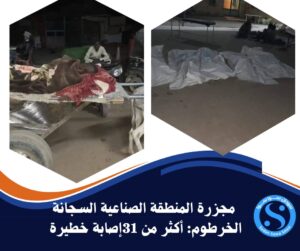
Sudan Sawa Sawa, January 8, 2025
On Tuesday, January 7, 2025, a tragic incident occurred in the industrial zone of Al-Sajjana, Khartoum, where the Sudanese Air Force conducted an airstrike that resulted in the deaths of numerous civilians and caused serious injuries. Although an accurate death toll is not yet available, reports indicate a significant number of victims from this bombing. Below is a detailed list of the injured, along with their locations and types of injuries:
Injured Individuals:
1. Reem Arif – 20 years old – Female – Burns on the head.
2. Malak Faisal – 25 years old – Female – Burns on the hands and legs.
3. Khadija Mousa Ahmed – Female – Various burns.
4. Asia Mousa – 16 years old – Female – Various injuries (shrapnel).
5. Reem Abiq – 20 years old – Female – Shrapnel injuries in the hand and leg.
6. Manara Jabra – 42 years old – Female – Various injuries (shrapnel).
7. Fatouma Yahya – 40 years old – Female – Body injury (burns).
8. Kafah Adam – 18 years old – Female – Various injuries (burns).
Mayu:
1. Wessal Mohammed – 19 years old – Female – Various burns.
2. Nasser Ramzi – Male – Various injuries (rash).
3. Mutawakkil Ali – 24 years old – Male – Various injuries (rash).
4. Samar – 20 years old – Female – Various injuries (rash).
5. Dalia Mohammed – 32 years old – Female – Injury in the hand and leg (rash).
6. Hossam Adam – 35 years old – Male – Head injury (rash).
7. Hazem Younis – 14 years old – Male – Leg injury (rash).
Al-Yarmouk:
1. Taysir Mohammed – 25 years old – Female – Various burns.
2. Dakhel Abdullah – 26 years old – Female – Various injuries in the leg (rash + burns).
3. Ahmed Salah – 18 years old – Male – Head and back injury (rash).
4. Ahmed Ismail – 35 years old – Male – Hand injury (rash).
5. Amal – 30 years old – Female – Fire injury.
6. Hanan Ajeeb – 40 years old – Female – Fire injury.
Ed Hessan:
1. Aatif Khalaf Allah – 35 years old – Male – Burns
2. Islam Abdel-Latif – 13 years old – Female – Injury to the right leg
3. Alia Ramadan – 26 years old – Female – Multiple injuries (burns)
Al ingaz:
1. Saleh Fadl – 27 years old – Male – Head injury (burns)
2. Salah Hassan – 27 years old – Male – Head injury (burns)
3. Zakaria Abdel-Rahman – 23 years old – Male – Multiple injuries (burns)
Other Locations:
– Al-Azhari: John Lone – 16 years old – Male – Multiple injuries (burns)
– Al-Salma: Musa Hassan – 50 years old – Male – Leg injury (burns)
– Al-Rayan: Enas Majd – 25 years old – Female – Hand and leg injuries (burns)
– Abdel-Rahman: Manahil Hamdeen – 40 years old – Female – Multiple injuries (burns)
Unknown Identities:
23 cases with various injuries (burns, fire), distributed among different locations or without a specific site.
“Arson, Looting, and Displacement of Residents in Hala Berti, Southwest of Labdo in East Darfur”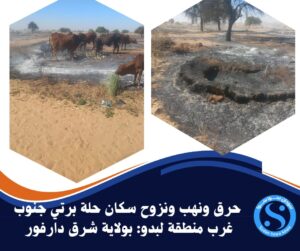
Sudan Sawa Sawa, January 8, 2025
On January 6, 2025, the Labdo locality in East Darfur, specifically the Hala Berti area located southwest of Labdo, suffered a violent attack carried out by armed groups. The repeated intrusion of livestock belonging to these groups into the residents’ farms has caused widespread panic and fear among the population, leading to a notable increase in displacement waves. According to information derived from local sources, this attack resulted in the burning and looting of citizens’ properties and assets, exacerbating their suffering and humanitarian conditions.
“25 Killed and Dozens Injured in Jabalain Locality, White Nile State“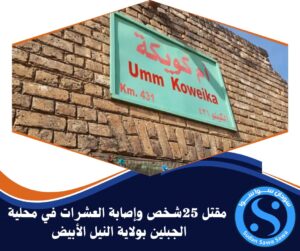
Sudan Sawa Sawa, January 8, 2025
Report by: Ahmed Farouk
Jabalain locality in White Nile State, specifically in the village of “Umm Koweika” located east of Jabalain city, has witnessed fierce clashes between the Sudanese Armed Forces and Rapid Support Forces, resulting in a significant number of casualties.
Incident Details:
Attack on Umm Koweika:
On the evening of Monday, January 6, 2025, the Rapid Support Forces launched an attack on the village of “Umm Koweika,” leading to the deaths of over 25 individuals and injuring dozens more. The village had become a refuge for many displaced persons from Sinner State who fled there to escape previous attacks.
Ambush in Al-Sharak Area:
Local sources reported that the Rapid Support Forces set up a well-planned ambush for the army and volunteers in the Al-Sharak area, resulting in the deaths of 34 individuals from the village of “Um Al-Qura.”
Humanitarian Implications:
The Jabalain area is experiencing a massive wave of population displacement from conflict-affected regions, with citizens facing severe shortages of food, water, and security. The United Nations has warned of a worsening humanitarian crisis in Sudan, noting the spread of hunger due to the ongoing conflict.
Calls for Peace:
Amid these tragic events, voices are rising for an end to the war and a search for peaceful solutions. Activists and civil society are urging the conflicting parties to cease hostilities and come to the negotiating table to achieve peace and stability in the region.
The violent events in Jabalain locality highlight the urgent need to stop hostilities and work towards a lasting peace that protects civilians and ensures them a dignified life free from violence and displacement.
“Reports of Killings, Rape, and Arbitrary Arrests in the Funo Ain Sero Region of North Darfur”
Sudan Sawa Sawa, January 1, 2025
Informed sources reported that on the Thursday morning of December 26, 2024, at around 4 AM, Sudanese army forces conducted an airdrop in the Funo area, west of Ain Sero in North Darfur. This air drop included four crates filled with weapons, ammunition, military uniforms, and cash. Following this event, local residents rushed to collect the money, while the identity of those who seized the equipment remains unknown.
On Sunday, December 29, Sheikh Musa Hilal, the chairman of Revolutionary Awakening Council arrived in Funo area from the Um Qura area, known as “Jena” in Dar Srif, accompanied by 25 vehicles belonging to the Revolutionary Awakening Council, as well as two vehicles from the Rapid Support Forces led by Hamid Abdul-Rasoul. The Sheikh Musa spoke with the village residents, confirming that these supplies belonged to the Awakening Council and were state-sponsored.
Subsequently, forces affiliated with the Awakening Council carried out horrific attacks, raping 12 girls aged between 12 and 16, and arbitrarily arresting over 65 citizens, including two village leaders and six children. Additionally, four women and three men were killed. The detainees were taken with them, while eight members of local administrations were released in an effort to recover the missing crates. They are under threatened with an assault on Ain Sero if a sum of 2 trillion Sudanese pounds won’t be paid.
#Sudan Sawa Sawa
Introduction
Reports are powerful tools for understanding the complexities of a nation. In Sudan, they provide detailed analyses of social, political, and economic conditions, offering critical insights for decision-makers, researchers, and citizens alike. “Reports” serves as a hub for accessing comprehensive studies and data, shedding light on Sudan’s challenges, achievements, and aspirations.
Social Reports
Social reports in Sudan delve into key issues such as education, healthcare, and social inequality. These reports highlight the lived realities of communities across the nation, offering data-driven insights into the needs and priorities of the population.
By analyzing these findings, policymakers and NGOs can design targeted interventions that address pressing social challenges and promote equitable development.
Political and Governance Reports
Political and governance reports provide a deep dive into Sudan’s evolving political landscape. From election monitoring to governance reforms, these documents assess the effectiveness of systems, institutions, and policies shaping the country.
Such reports are essential for fostering transparency, accountability, and informed civic engagement, ensuring that Sudan’s democratic aspirations are supported by evidence-based decision-making.
Economic Reports
Economic reports offer a comprehensive overview of Sudan’s financial landscape, including analyses of trade, agriculture, and industrial sectors. These studies examine the impact of policies, international sanctions, and market trends on Sudan’s economy.
For businesses, investors, and policymakers, these reports serve as valuable resources for understanding opportunities and challenges in Sudan’s economic growth and development.
Environmental and Climate Reports
Sudan’s environment faces significant pressures from climate change, deforestation, and desertification. Environmental reports provide critical insights into these challenges, highlighting the urgent need for sustainable practices and conservation efforts.
These reports guide both local and international initiatives aimed at protecting Sudan’s natural resources and mitigating the effects of environmental degradation.
Access to Reports
“Reports” ensures that these important resources are accessible to a broad audience. By offering summaries, translations, and downloadable formats, the platform allows individuals from all sectors to engage with Sudan’s key reports and leverage their findings.
Conclusion
Reports are essential for illuminating Sudan’s realities, offering data and analysis that inform progress and inspire solutions. By providing access to comprehensive studies across social, political, economic, and environmental domains, “Reports” empowers stakeholders to address challenges and seize opportunities.
In a rapidly changing nation, these reports serve as guides for understanding, action, and development, ensuring that Sudan’s path forward is built on a foundation of knowledge and insight.
